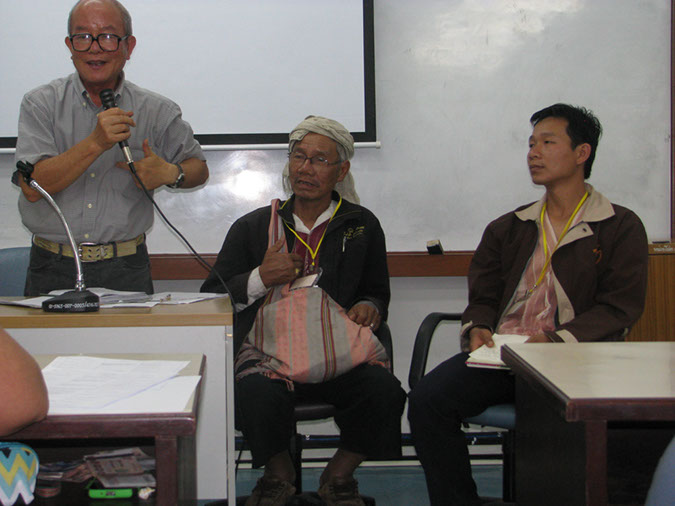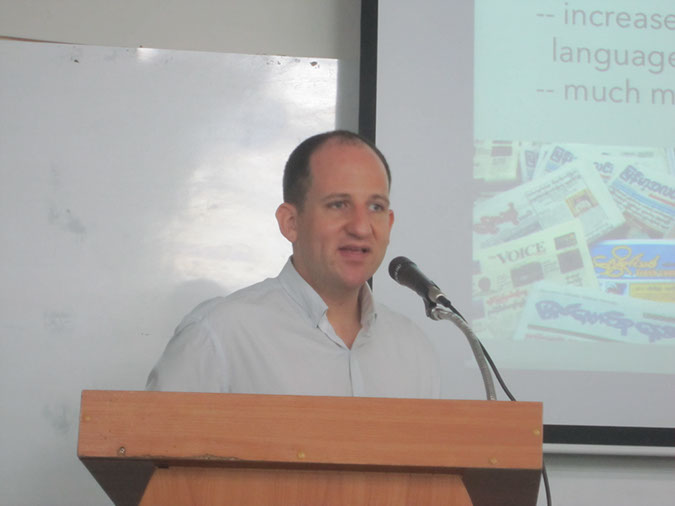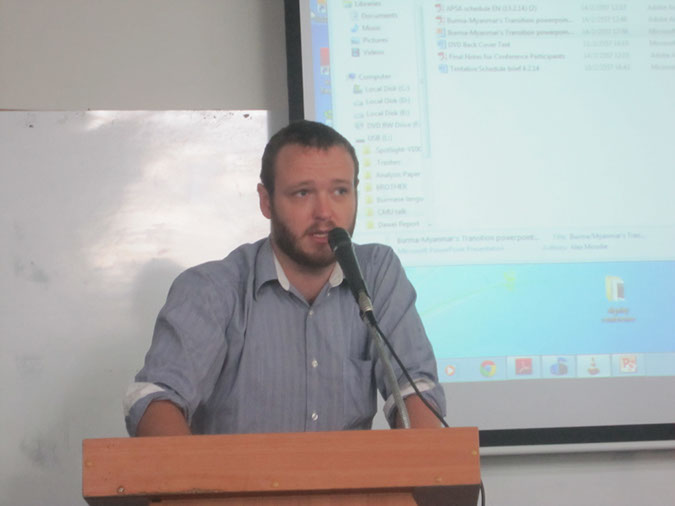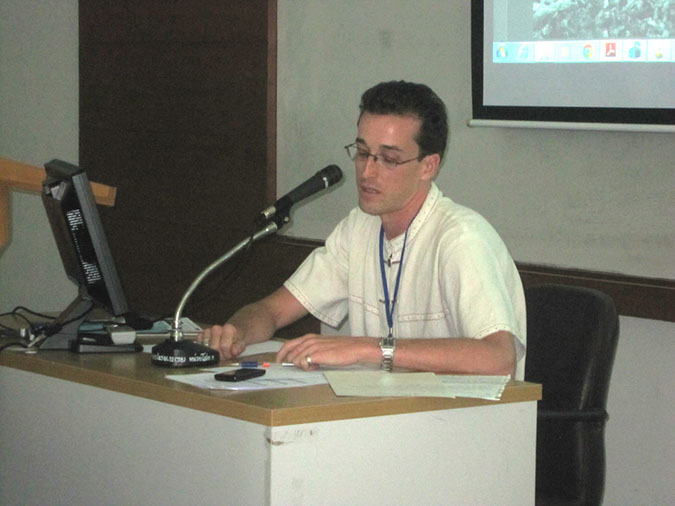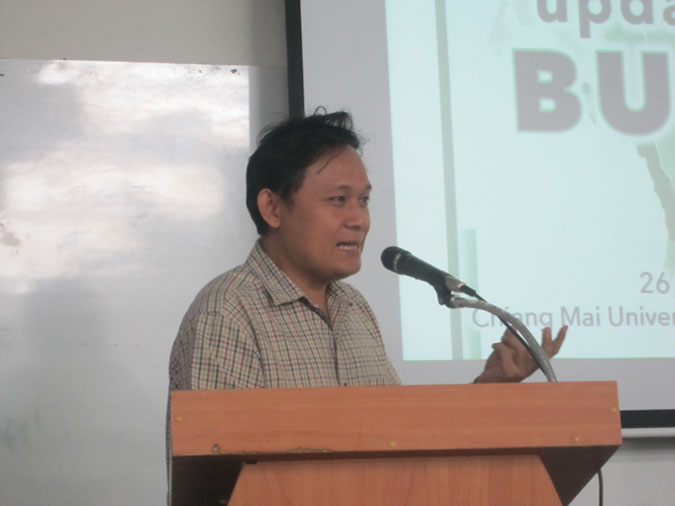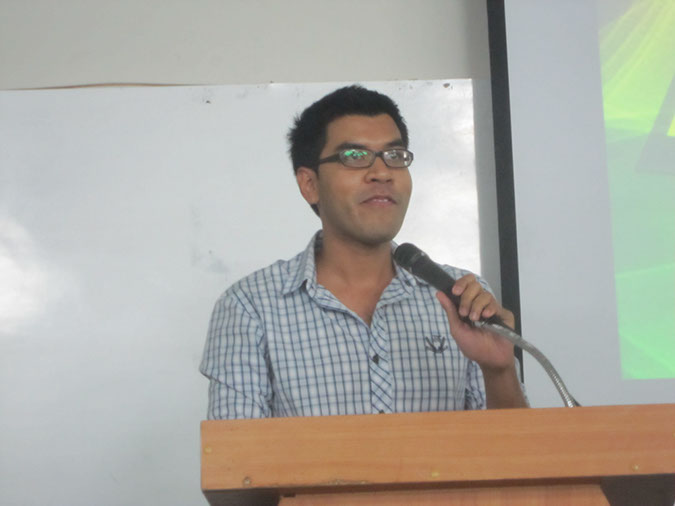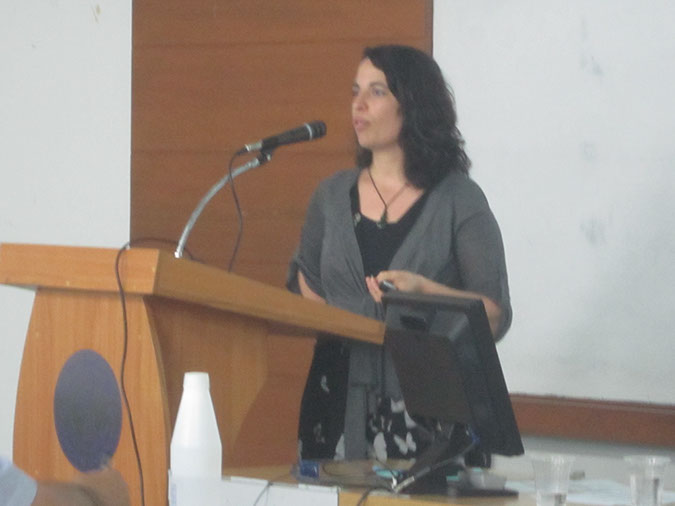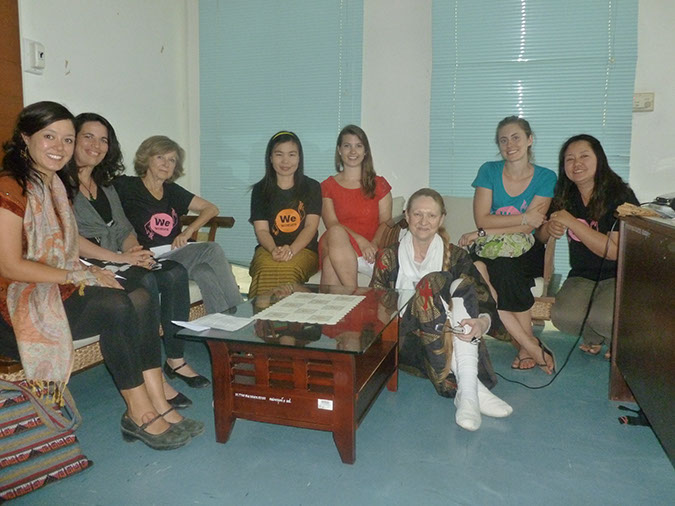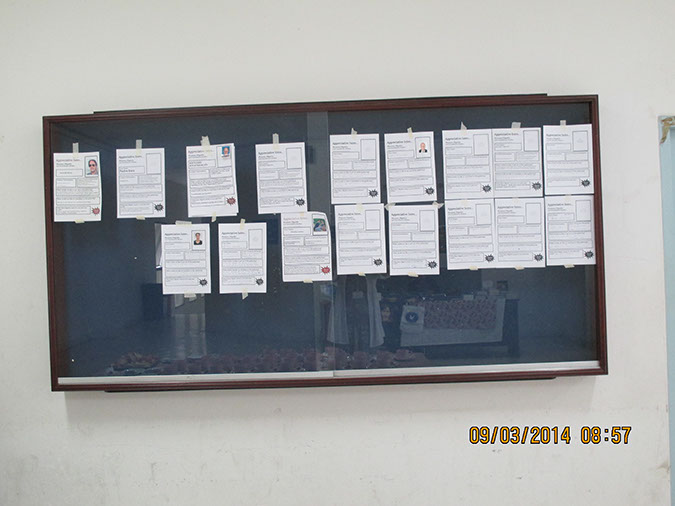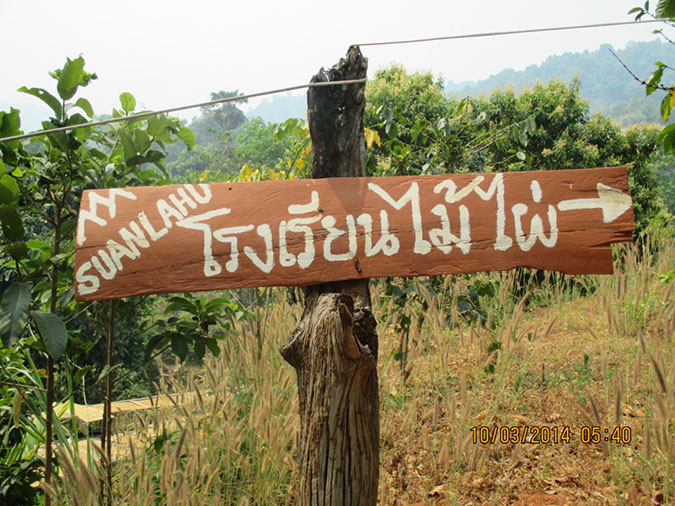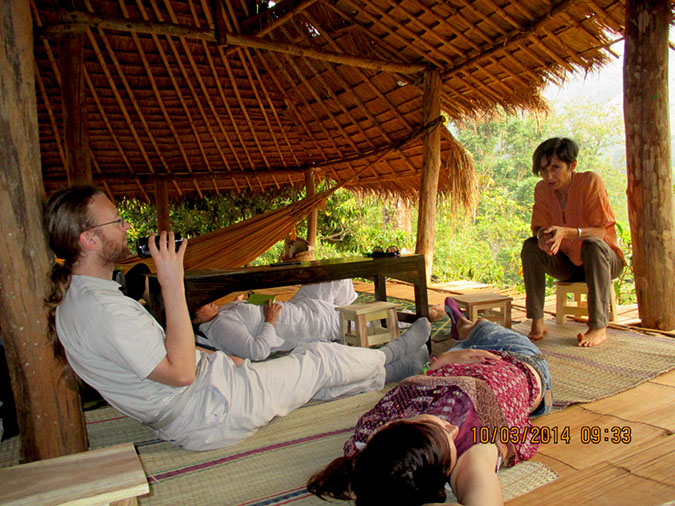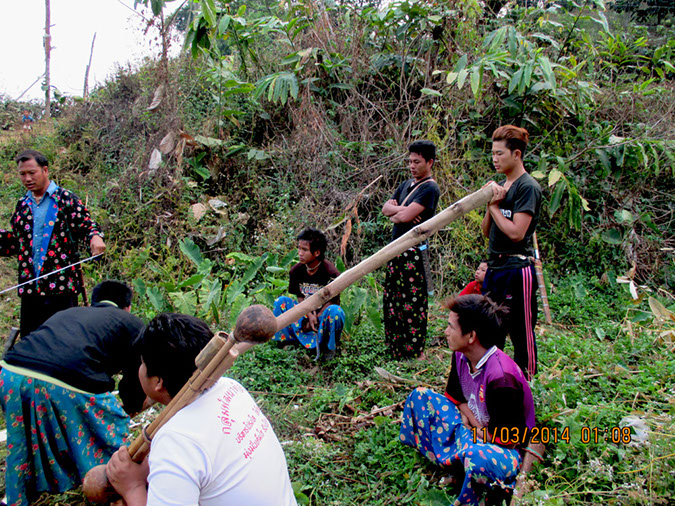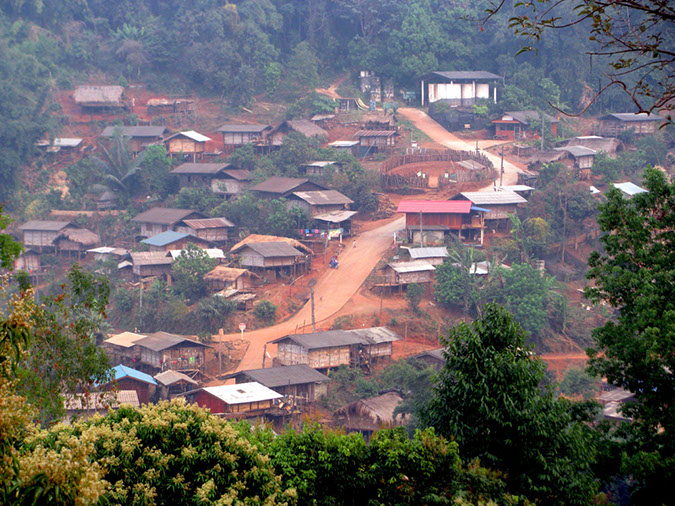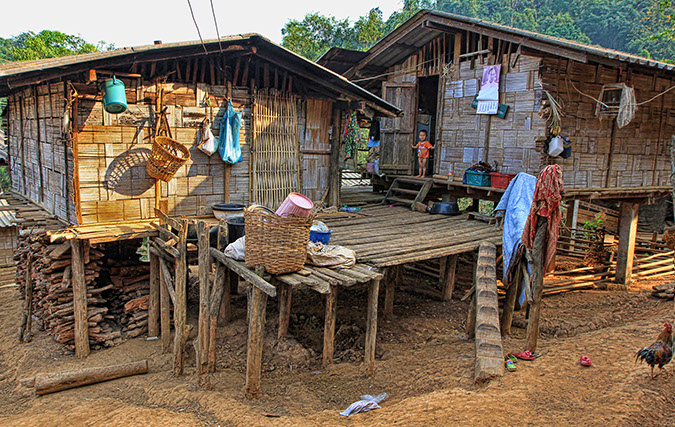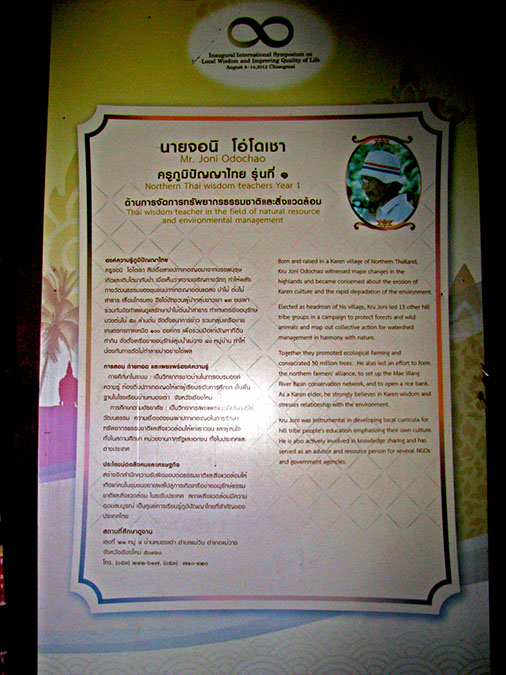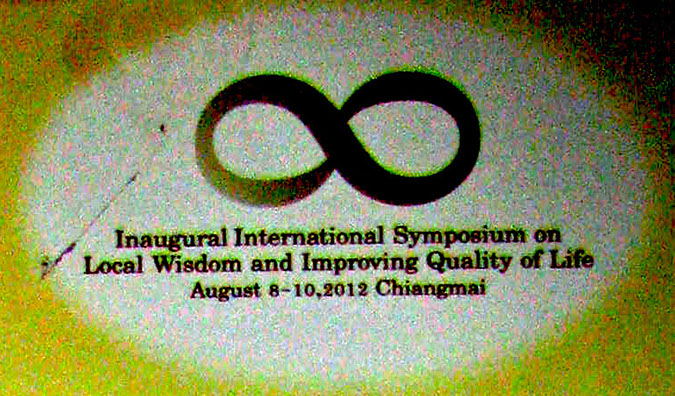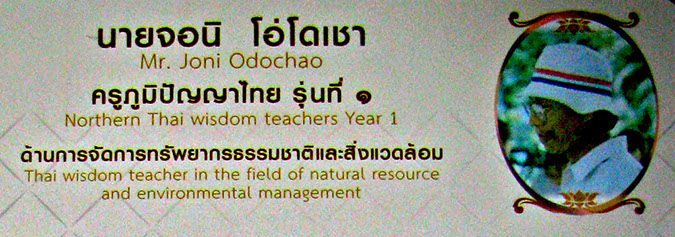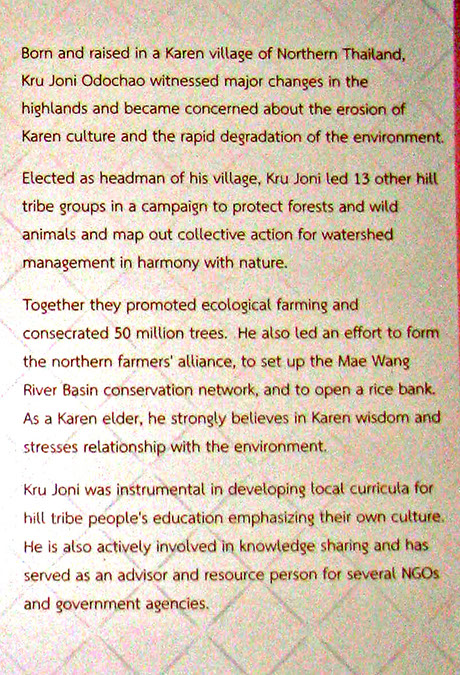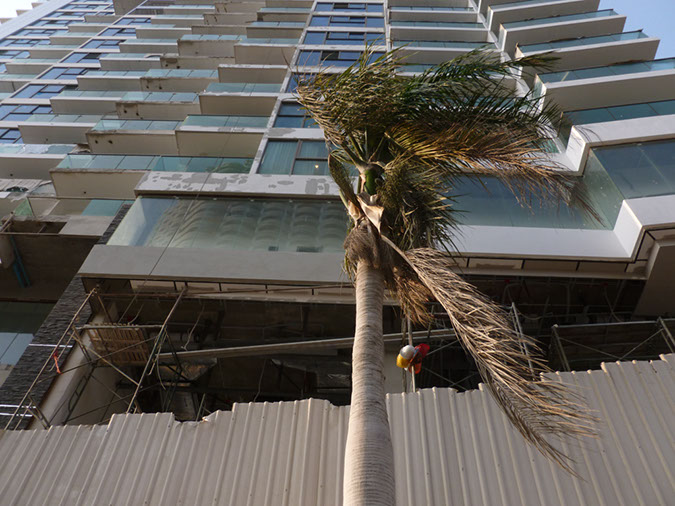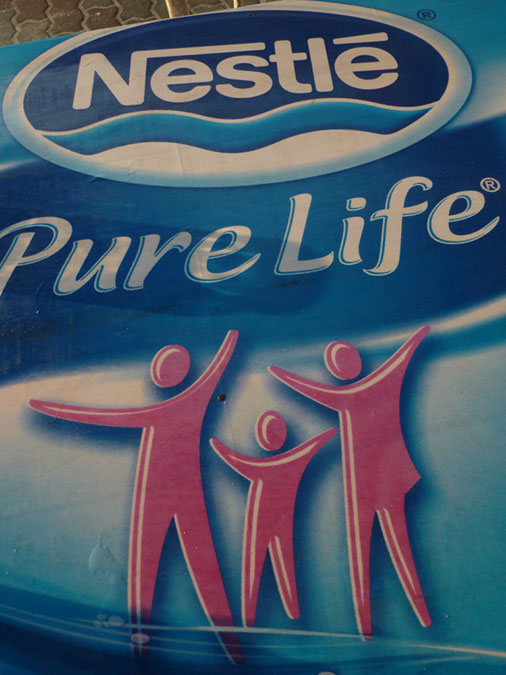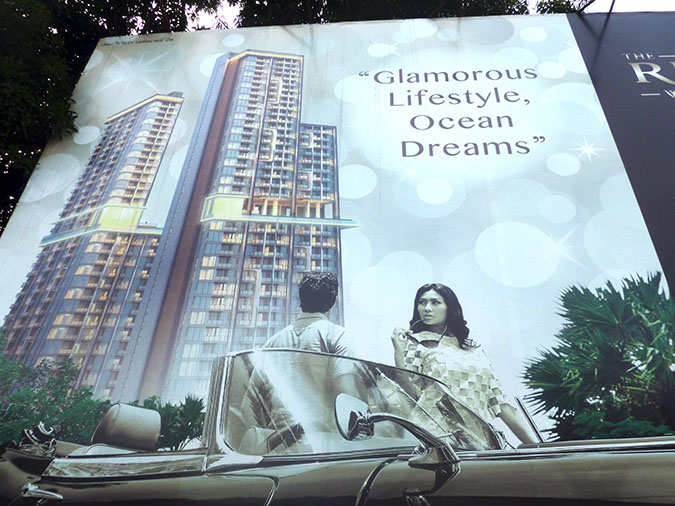Newsletter Nr. 23 (March 2014, subsequent to our 23rd Annual Conference of Human Dignity and Humiliation Studies, in Chiang Mai, Northern Thailand, 8th - 12th March 2014)
Compiled by Evelin G. Lindner, in 2014
(Note: This newsletter is written in British English, since this conference took place outside of the U.S. In our NY workshops, we usually use American English.)
Contents
• Pictures
• Thanks!
• Evelin Lindner's reflections after our conference
• Your reflections after our conference
• Papers
• Announcements and Good News
• Welcome Again!
Pictures
(Important note to our conference particants: During our conferences, we always make an effort to ask for your permission to have your pictures posted on this website. However, you may have overheard or misunderstood our question, or you may have changed your mind since, either in total or for specific pictures/videos, please let us know! Thank you! Since we wish to walk the talk of dignity, it is very important for us to do our utmost in respecting everybody's privacy. We refrain from gathering written permissions from you during our conferences, since we value the building of mutual trust in relationships, and we also would like to refrain from contributing to an ever more bureaucratic and legalistic society.)
• Day One, 8th March 2014: see the photos taken by Donna Fujimoto, Marie Ingand, and Trine Eklund Videos: Day One, 8th March 2014 Day Three and Four, at the Lahu village Suan Lahu, 10th - 11th March 2014 (Important note to our conference particants: During our conference, we asked for your permission to have your pictures posted here, however, if you changed your mind since, either in total or for specific pictures/videos, please let us know! Thank you! Since we wish to walk the talk of dignity, it is very important for us to do our utmost in respecting everybody's privacy. We refrain from gathering written permissions from you during our conferences, since we value the building of mutual trust in relationships, and we also would like to refrain from contributing to an ever more bureaucratic and legalistic society.) |
| Day One, 8th March 2014 • Please click on the picture at the top or here to see more photos taken by Donna Fujimoto. • Please click on the picture in the middle or here to see more photos taken by Marie Ingand. • Please click on the picture at the bottom or here to see more photos taken by Trine Eklund. Schedule: • 01 Introduction by Kjell Skyllstad and Evelin Lindner, and Presentation of Participants Presentations by Thai NGOs and local filmmakers: • 10.30 – 12.00 02 Overview of Ethnic and Indigenous Human Rights in Asia, by Bernice Aquino See, Asian Indigenous Peoples Pact (AIPP) • 13:30 – 3:00 03 Film Presentation: Killing the Mekong, Dam by Dam, by Tom Fawthrop • 15:00 –16:30 04 Special Talk: A Voice from Indigenous People, by Joni Odochaw, a Karen Sage and Former Village Headman from the Karen Village Ban Nong Thao • 16:30 – 17:30 Curator Walk: Majesty in the Mountains, by Victoria Vorreiter • Dinner at the Galae Restaurant, 65 Suthep Road, Chiang Mai, Telephone: 053 – 328 – 455 (see the picture at the bottom) |
| Day Two, 9th March 2014 • Please click on the picture at the bottom or here to see more photos taken by Trine Eklund. • Please click on the pictures at the top or here to see more photos taken by Donna Fujimoto. • Please click on the picture in the second row or here to see more photos taken by Cornelia Dragusin and Evelin Lindner with Evelin's camera. • Please click on the picture in the middle or here to see more photos taken by Marie Ingand. We displayed all Appreciative Introductions on the wall of the foyer of the conference room. What you see here is the situation as it was on 9th March. We are very thankful to Marie Ingand and her daughter Sofie for being the guardians and nurturers of this process. They kindly invited our conference participants to share their introductions on the wall. Please click here to see more photos taken by Marie Ingand. We thank Khun Chanida Puranapun for scanning in the Introductions and making a Pdf file for us. Schedule: • 9:00–9:05 Welcome by Dr. Chayan Vaddhanaphuti 'Burma's Transition: Reforms, Ethnic Groups, and Ceasefires': • 9.05–10.20 05 Update from Burma: An Overview of Changes, 2010-2014, by Garrett Kostin (Burma Study Center) • 10.35–11.45 06 Guns, Briefcases, and Inequality: The Neglected War in Kachin State + Prospects for Peace and National Reconciliation in Burma/Myanmar, by Alex James (Burma Partnership) • 11.50–12.20 07 Dignity Amidst The Rubbish: A Burmese Migrant Community in Thailand, by Jeffrey Warner, photojournalist • 13.45–14.45 08 Nothing About Us Without Us: Refugees, Repatriation, and Representation, by Saw Nay Kaw (Karen Environmental and Social Action Network, KESAN) • 14.50–16.00 09 Rohingya in Transit: Human Trafficking and Statelessness, by Ekraj Sabu (International Institute of Peace Studies, Asian Muslim Network) • 16.15–17.25 10 Emerging Women of Burma, by Ursula Cats, the founder of the We Women Foundation, together with her students and volunteers • 17.25–17.30 Concluding Remarks by Dr. Chayan Vaddhanaphuti |
|
| Day Three and Four, 10th-11th March 2014 Excursion to the Lahu village Suan Lahu invited by Carina zur Strassen • Please click on the picture at the top or here to see more photos taken by Donna Fujimoto. • Please click on the pictures in the second row or here to see more photos taken by Evelin Lindner. • Please click on the pictures in the middle or here to see more photos taken by Marie Ingand. • Please click on the pictures at the bottom or here to see more photos taken by Trine Eklund. • Please click on the picture at the very bottom or here to see more photos taken by Jeffrey Warner on 10-11th March 2014, and on two earlier visits in 2011 and 2012. Videos: • 11 Arrival and Welcome by Carina zur Strassen, recorded by Jeffrey Warner, 10th March 2014 • 12 At the Learning Center with Evelin Lindner, recorded by Mark Petz, 10th March 2014 • 13 At the Learning Center with Carina zur Strassen, recorded by Donna Fujimoto, 10th March 2014 • 14 At the Learning Center, Interview with Carina zur Strassen and Evelin Lindner, recorded by Donna Fujimoto, 10th March 2014 • 15 Interview with Laew, Mark Petz, and Carina zur Strassen, recorded by Donna Fujimoto, 11th March 2014 • 16 Coffee Processing, recorded by Jeffrey Warner, 11th March 2014 • 17 Village Impressions, recorded by Jeffrey Warner, 11th March 2014 • Carina zur Strassen later drew our attention to the film Landfill Harmonic - An Orchestra for Kids with Instruments Made from Trash (La armonía del vertedero - Orquesta de Instrumentos Reciclados de Cateura), published on 29 Dec 2012. Please note the black tarps covering the landscape. Underneath is commercial flower agribusiness. Pesticides poison the farmers, and they are all in debt. In Carina's house, I found the famous poster depicting Native American leader Sitting Bull, quoting the Cree prophecy: 'When all the trees have been cut down, when all the animals have been hunted, when all the waters are polluted, when all the air is unsafe to breathe, only then will you discover you cannot eat money'. |
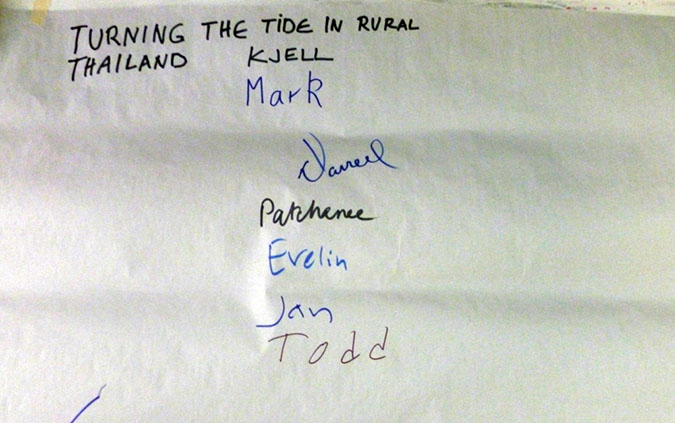 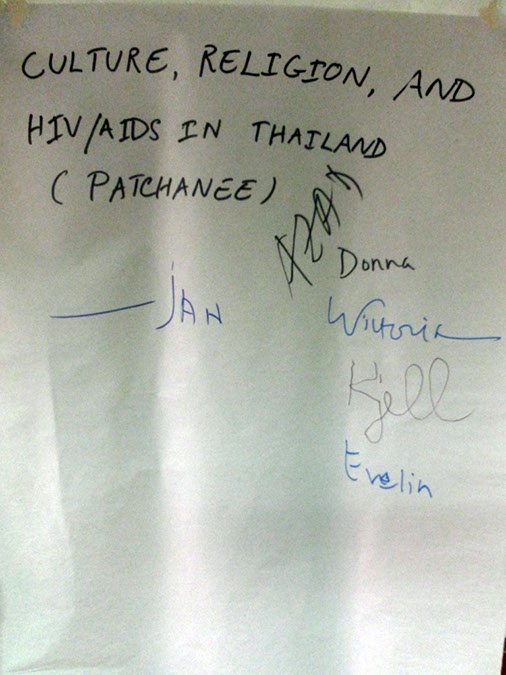 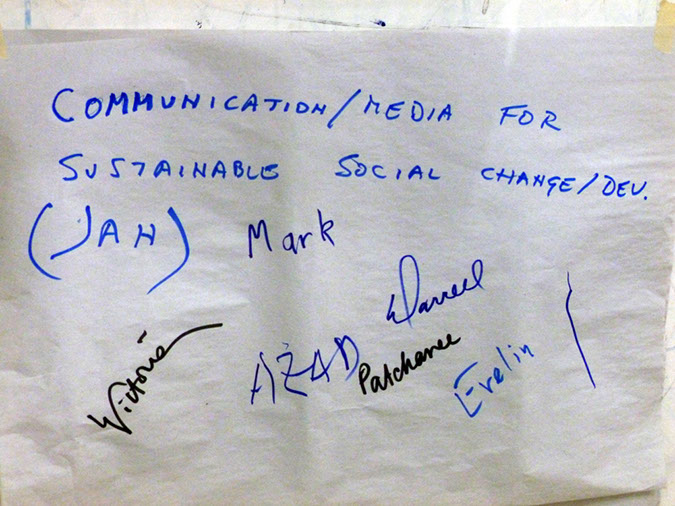 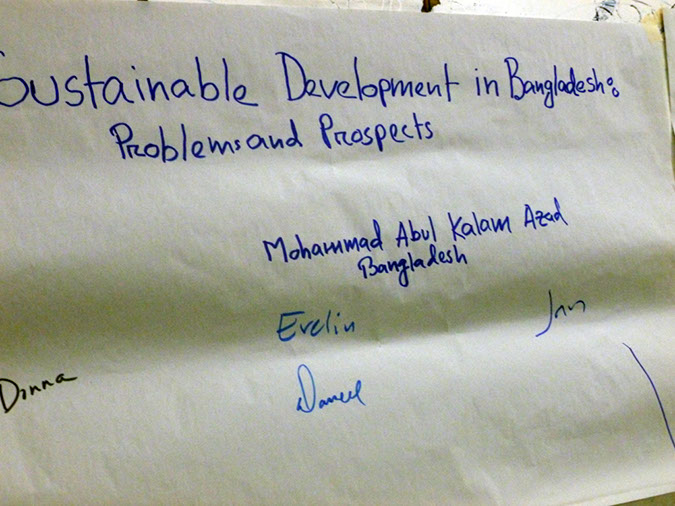 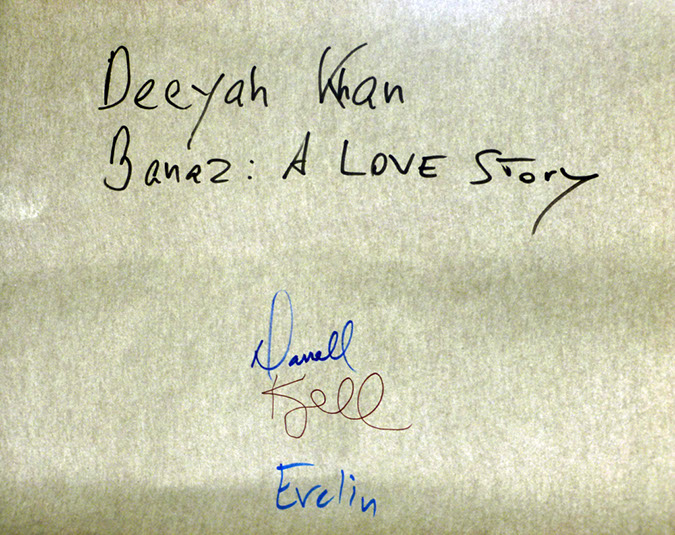 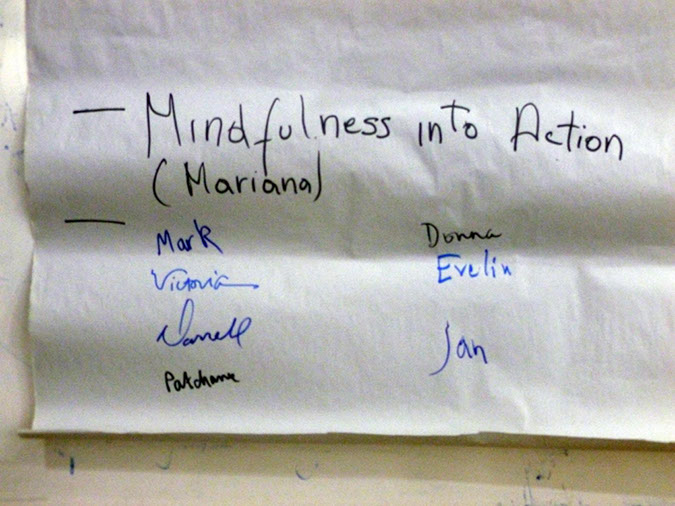 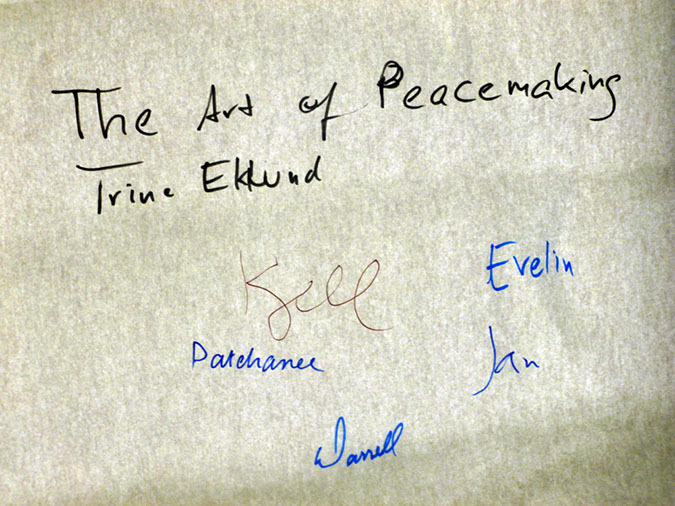 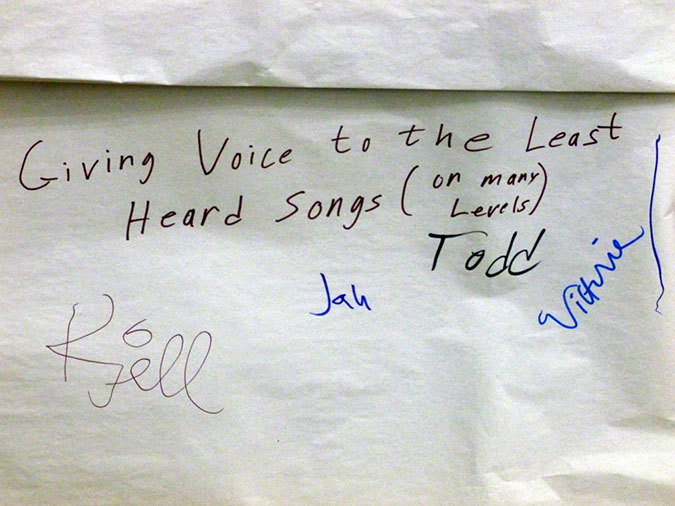 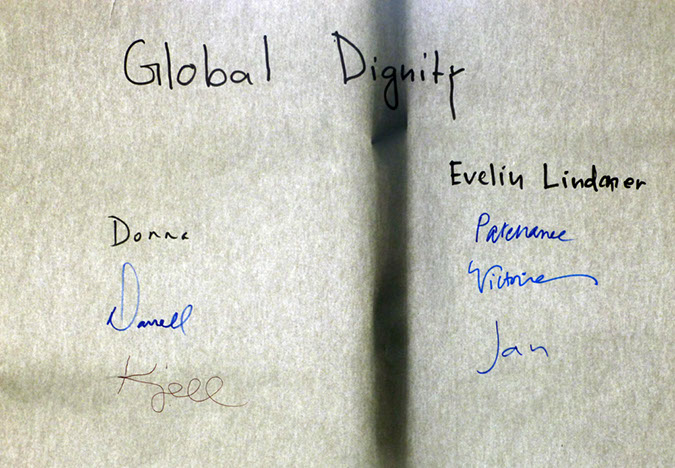 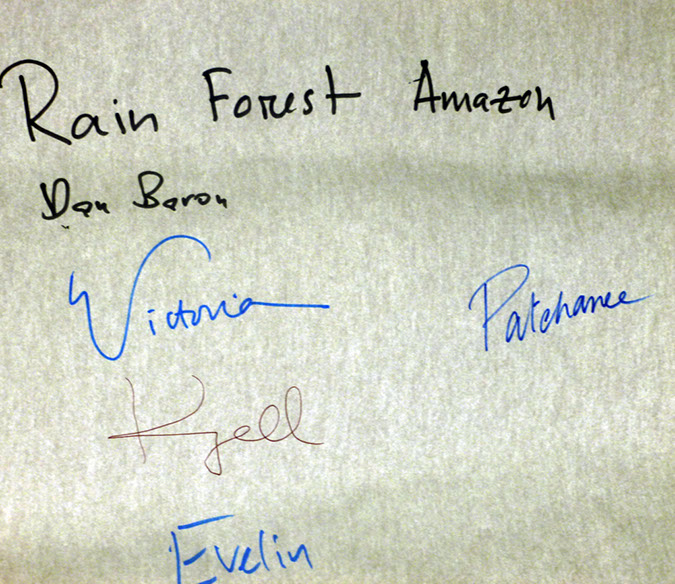 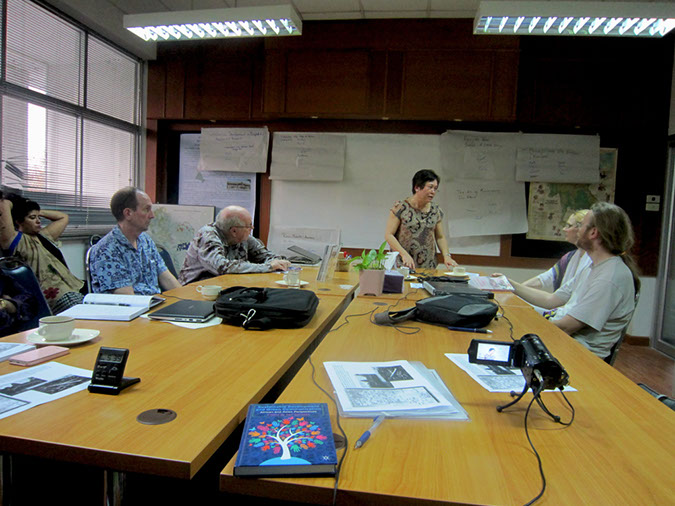  |
| Day Four, 11th March 2014 • Please click on the pictures at the top or here to see our Dignilogue themes (they were shared in the order displayed here: the first two were shared on Day Four, the rest on Day Five). • Please click on the picture in the middle or here to see more photos taken by Donna Fujimoto. • Please click on the picture at the bottom or here to see more photos taken by Evelin Lindner. Videos: • 18 Turning the Tide in Rural Thailand, by Kjell Skyllstad (see The Life University: Learning Institute For Everyone, LIFE) • 19 Culture, Religion, and HIV/Aids in Thailand, by Patchanee Malikhao (see her book Sex in the Village. Culture, Religion and HIV/AIDS in Thailand (Penang-Chiang Mai: Southbound & Silkworm Publishers, 2011) |
   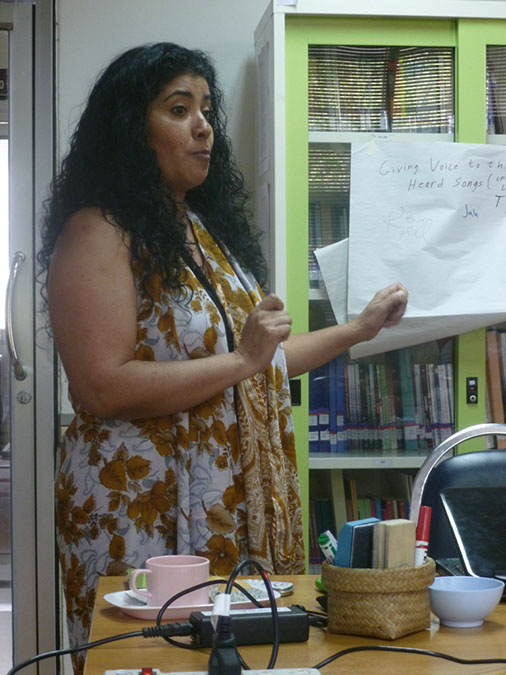 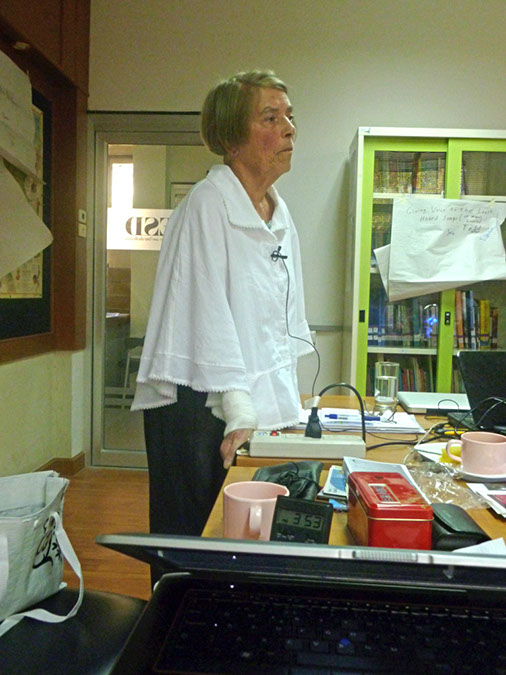    |
Day Five, 12th March 2014 |
 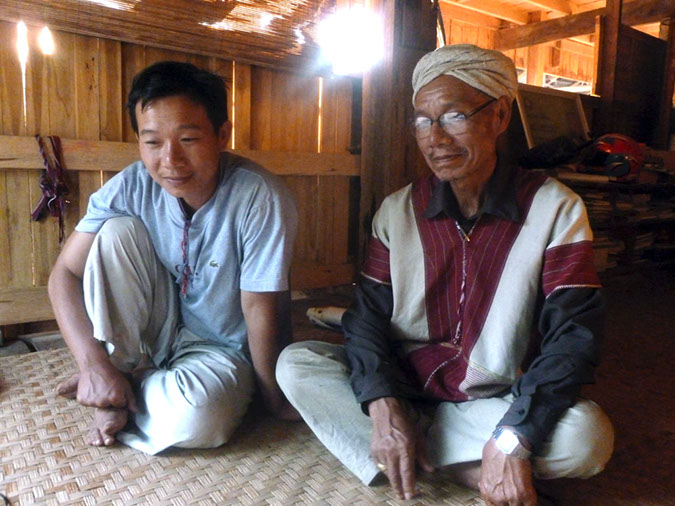 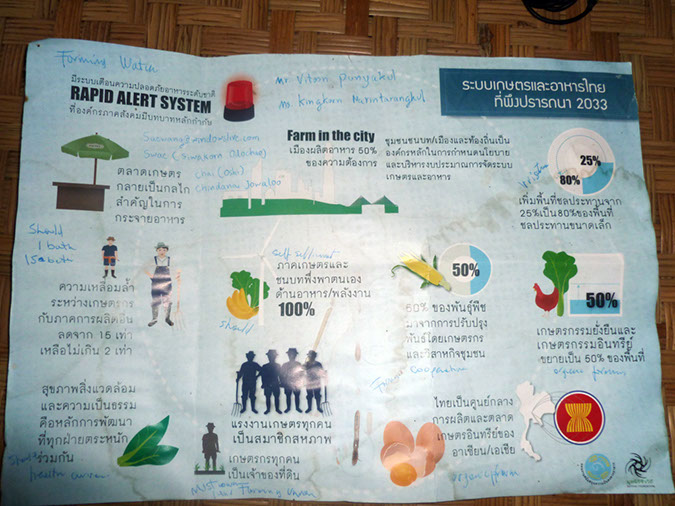  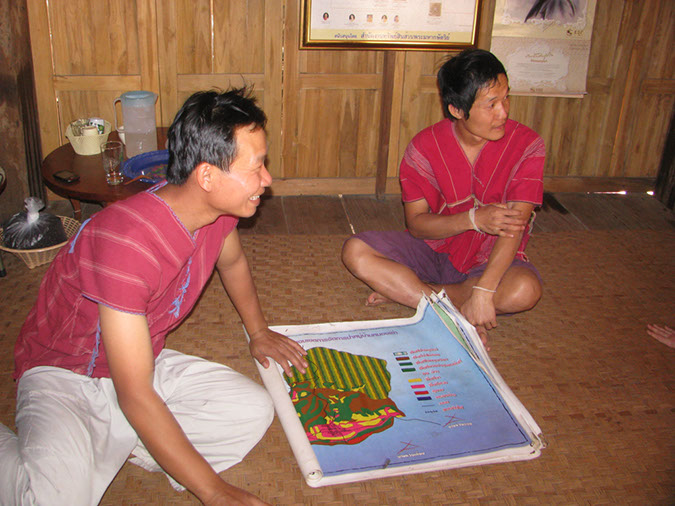 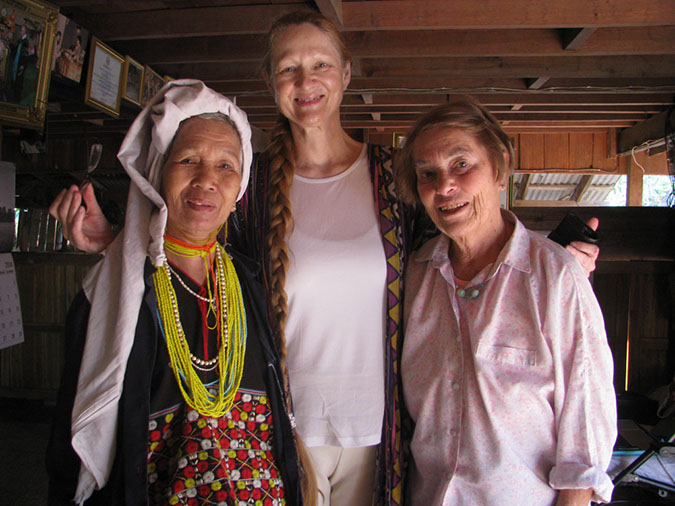 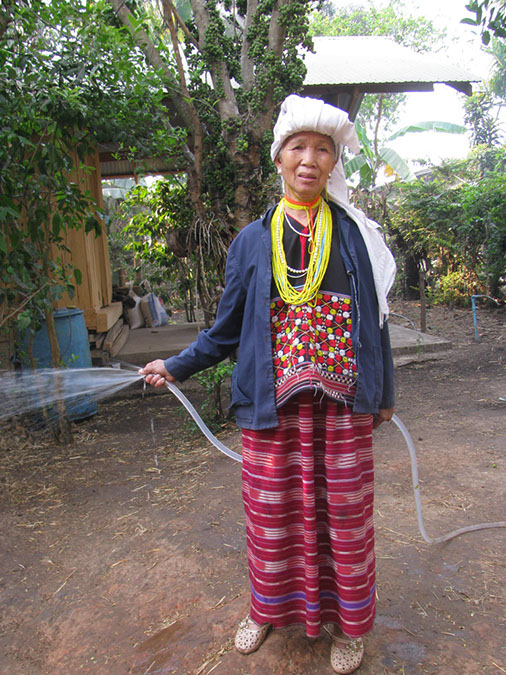 |
Day Six and Seven, 13th-14th March 2014 |
 |
| On 7th March 2014, having the privilege of being welcomed to a wonderful pre-conference meeting with Chayan Vaddhanaphuti, Professor and Director of the Regional Center for Social Science and Sustainable Development (RSCD), and the Center of Ethnic Studies and Development (CESD), Faculty of Social Sciences, Chiang Mai University, and Khun (Mrs or Ms) Chanida Puranapun, and their team! See the announcement of our conference, which will start tomorrow, 8th March! Please click on the picture above to see it larger or here to see more photos from Evelin's camera taken on 7th March 2014. |
Dear Friends! Thanks!
We had a remarkable conference in Chiang Mai, Northern Thailand! The conference had the title 'Returning Dignity'.
This business card inspired Kjell Skyllstad to suggest the motto 'Returning Dignity' for our 23rd conference!
The card reads in English and in Thai:
Dignity Returns, produced by Solidarity Factory, factory of worker, own and man by workers (sic)
Please allow me to begin this newsletter by expressing my profound gratitude to our esteemed host, organiser, and convener Ajahn (Professor) Chayan Vaddhanaphuti. Never before did we have such a wonderful welcome! You, dear Ajahn Chayan Vaddhanaphuti, gathered speakers who were critical for us to understand the present situation of dignity and humiliation in the region! What you brought to us was of extreme importance!
Dr. Chayan Vaddhanaphuti is Professor and Director of the Regional Center for Social Science and Sustainable Development (RCSD) and of the Center for Ethnic Studies and Development (CESD) at the Faculty of Social Sciences (CMU) in Northern Thailand. He is an anthropologist who earned his Ph.D. from Stanford University in 1984 and received an Honorary Doctorate in Social Anthropology from Göteborg University, Sweden, in 2004. He has edited numerous books, including recently, Transcending State Boundaries (2011).
We are also deeply thankful to Victoria Vorreiter for the extraordinary leadership that she has extended to us, as well as to Khun Chanida Puranapun, who gave us her immeasurable and untiring support! The three of you showed a caring presence to our conference participants that was absolutely breath-taking. You never forgot even the smallest detail, from your generous pre-conference preparations to your wonderful guidance and interventions throughout the conference! You made this conference a lifetime experience for us, an experience of deep understanding and profound insights into the dynamics of dignity and humiliation!
Victoria Vorreiter deserves an extra word of recognition and acknowledgement here, for her heroic work of documenting the traditional life in the region before it is being destroyed: Humankind ought to lie at her feet in gratitude! Similarly, Jeffrey Warner dedicates his entire life to seeing dignity where others only see poverty. You are Beacons of Dignity in this world! We celebrate you!
You, dear Ajahn Chayan Vaddhanaphuti, have brought an innovation to our conference that will be extremely valuable for us also in the future. We will learn from you already in our next conference in Kigali, Rwanda, in May/June 2015. Let me explain: Our conferences usually have two parts, first, what we call Public Event, and, second, what we call Dignilogue Workshop (we made the word dignilogue from dignity + dialogue). Our Public Event is meant to serve two aims: first, it aims to bring the local state-of-affairs to our global conference participants, and, second, it aims to introduce local audiences to our global dignity work. You, dear Ajahn Chayan, have wonderfully emphasised the first aspect of our Public Event! This aspect is particularly important in regions that may be unknown to many coming from afar. You have expanded our Public Event to encompass two entire conference days, and you invited us to go on two excursions into the rural regions around Chiang Mai!
All of this was extremely informative and educational to all of us! Please allow me to share my personal experience with you, dear Ajahn Chayan: I can't tell you how much I learned from the amazing speakers that you have gathered! And from our two excursions! I must admit that I lack adequate words to express my personal appreciation, recognition, and deep gratitude to you, dear Ajahn Chayan! You and your work are a true Beacon of Dignity! I am so proud that we were able to honour you with our Beacon of Dignity Award!
Next, Kjell Skyllstad deserves our infinite gratitude. He is a Visiting Professor at the Faculty of Fine and Applied Arts at Chulalongkorn University, Bangkok, and Chief Editor of the Journal of Urban Culture Studies. He was the wonderful inspiring force behind the entire conference!
Then we want to thank all participants for joining hands in making this conference one of our most special and most memorable ones. Everyone participated by not only offering their particular personal perspectives but everyone also engaged in an enormously enriching process of co-creating new meaning.
I wish to acknowledge particularly Mariana Vergara from South America, where she works with indigenous peoples, writing her doctorate at Columbia University in New York City. She came from the other side of the globe, and, despite of being seriously jet-lagged, she stepped up to take responsibility, and she did that untiringly. She took the responsibility of being the guardian of our dignity economics approach and of the practicalities of organising our dignilogues, to give just two examples.
Let me explain our solidarity economics approach (see also my book A Dignity Economy). There are no registration fees for our HumanDHS conferences (or our online sessions). By practicing a 'lean, green' spirit of shared responsibility, our HumanDHS community has conducted these events for more than a decade by assessing our expenses during the conference and inviting participants to contribute according to their ability (we also gladly welcome electronic contributions in support of our work). I myself live almost without money and do not receive any monetary remuneration for my dignity work, which I consider to be a work of love which I gift to our human family. The cost of this conference for Chiang Mai University, including meals and transportation and professional video recording on the first two days, was 50 000 Baht. In other words, we had to find ways to cover this amount throughout the conference in the most dignified and dignifying ways. Mariana kindly approached every participant and informed them of our dignity economy approach, inviting them to contribute according to ability. Please let me join her in thanking everyone for their contributions! Join me also in thanking everyone for treating Mariana kindly and appreciating her efforts, rather than misunderstanding her questions 'for money' to be rude. We are deeply thankful in particular to those two of our participants who shouldered an entire fifth of this amount each, and who in this way compensated for others who contributed more in kind than in monetary ways! We send you our profound gratitude for your generosity! You are beacons of dignity!
At all our conferences, all participants are fully responsible for bearing the cost of their own travel, transportation, and accommodation arrangements. We kindly ask local participants who reside in close proximity of the conference venue to lend a helping hand to those traveling from afar, which helps us keep our events collaborative and affordable for all. Allow me to extend our deep thanks to all those who reside in Chiang Mai and generously gave their support to our foreign participants!
I would now like to invite everyone to contribute to this newsletter with your reflections (whatever you wish to share publicly, just send it to me so that I can paste it in further down)! We invite comments and thoughts both from the participants, and from those who were with us in spirit! For example, perhaps you would like to share with us:
1. What worked well for you?
2. What do you think would work even better in future conferences?
3. How would you like to help?
Please allow me to remind you that all our conferences are part of our ongoing relationship-building work (rather than 'stand-alone' events). We wish to nurture a global community of people who strive to bring more dignity into the world. Our 23rd Annual Dignity Conference was one opportunity, unique in its intensity, one that inspired me personally deeply. The diversity of backgrounds of our participants was remarkable, these are just a few examples: North America/Japan, North America/Thailand, South America/Indigenous/North America, Bangladesh/Costa Rica, Netherlands/global, Thailand/global, Australia/Netherlands, Norway/global, or Silesia/global. Many of the participants in our conferences and many members in our global network share a biography of journeying, geographically and also with respect to their life paths and experiences. Many have had profound turning points in their lives, often akin to near-death experiences, which often foster deep change.
The term 'co-creation' got a much more tangible meaning throughout this conference: All who participated joined in to co-create an entire conference as an artful 'social sculpture' of care and dignity. We managed to do far more than merely speak about the topics at hand in theoretical terms. We manifested experiences that drew us all into deeper understanding. As much as we could, we were true to the title of our conference, 'Returning Dignity', and we did so in a number of different ways:
• We avoided the downsides of overspecialisation by drawing specialised research together to forge comprehensive viewpoints.
• We included scholars from several disciplines.
• We included a broad range of knowledge from participants beyond established academia.
• We modelled selfless co-leadership.
• We included all generations, and both women and men, thus honouring the tradition of community learning that Karen sage Joni Odochaw and his family explained to us so well. Traditional community learning means that all can teach all and at the same time learn from all. It means that wise elders are listened to, while young people's talents and ideas are recognised and nurtured.
• We stepped out of our usual 'armours' (professional, ethnic, national, etc.) and met as fellow human beings. Thus we enriched the traditional approach to academic conferences with insights from psychology, including the insight that connected ways of knowing lead to greater clarity of thought, ideas, and action, more so than traditional separate ways of knowing (see Mary Belenky).
• We attempted to model and manifest conflict resolution in the relational ways that are in line with the indigenous wisdom we learned from Karen sage Joni Odochaw. We endeavoured to refrain from putting each other 'into place', we avoided concentrating on the contents of what was said and judging everything as being 'right or wrong'. We refrained from 'agreeing or disagreeing' and tried to stay away from competitively defending our ego-boundaries. We attempted to stay clear of debate, and rather nurtured each other's strengths through dialogue. Wherever we saw 'a glass half empty', we looked again and saw it as 'half full', and then we helped it to become even fuller. Our aim was to give priority to the carrying capacity of the relationships emerging in our group and to the capacity of these relationships to nurture joint learning and growing. Therefore we took great care to avoid creating rifts in this carrying capacity; we instead nurtured the cohesion of loving care in our group.
• Nobody is perfect - therefore, we always hold hands to 'stumble forward together', as Linda Hartling has formulated it. It lies in the nature of being blind that one may also be blind to one's own blindness - only through being open to listening each other into voice (Linda's expression) can we collectively see more.
• As always, also this time, we attempted to be at the cutting edge of experimenting with technology that has the potential to connect people who otherwise would not be able to participate and contribute to the dialogue. This website, the videos and still photos are examples. I do my best after our conferences to upload whatever material I have permission to upload. In earlier conferences, we successfully experimented with live-streaming, yet, we have to acknowledge that this is only possible with even more volunteer help. Otherwise we would incur so high cost for IT support that our conferences would become unaffordable. If there is anybody planning to join us in our future conferences and who is knowledgeable and willing to dedicate their time during the conference to operating these systems pro bono, please come forward! We have the privilege of having access to the UK's Open University FlashMeeting platform and to Adobe Connect. And, of course, Skype could always be used.
• This is to name but a few aspects...
Jan Servaes and Darrell Moen shared something very important with us, namely, that academics are not necessarily listened to by politicians, including in UN contexts. Jan told us that he avoids being drawn into political pressures and he is very protective of his independence as an academic. This experience is shared by many members of our global dignity family. Not least my personal experience coincides with Jan's insights. We, in our dignity network, have thought for decades about the root causes of this state-of-affairs in our world. As one of our long-term antidotes we attempt to change the dominant culture of our world, and this includes the culture of conferences. We attempt to manifest a different style of our way of being-in-this-world. We strive for a style that upholds dignity also in how we interact, rather than only in what we communicate. We wish to do more than only speak about dignity, we wish to see whether it is possible to walk our talk in all segments of life, including in our conferences.
This is the reason for why we strive to conduct our conferences in slightly different ways as compared to mainstream conferences. The traditional format of conferences usually mirrors the modern concept of human society as a kind of machinery where individuals are isolated cogs in a wheel serving supposedly higher goals ('market forces', for example). The potential strength of human solidarity is pushed out. Being 'professional' means disengaging from one's responsibilities as fellow human beings, it calls on participants to reduce their spirit of cooperation and communal sharing to the spirit of authority ranking and equality matching at best, or, at worst, to the competitive spirit of market pricing (to employ anthropologist Alan Page Fiske's concepts). Louise Sundararajan wrote an insightful article, in which she connects Fiske's concepts with indigenous psychology, titled 'Indigenous Psychology: Grounding Science in Culture, Why and How?' in Anthropology in China, 2012.
'Going native' is often looked down upon. What we wish to do is to 'go native' in the sense of being human among human beings, in the spirit of the African philosophy of Ubuntu.
In the Karen village of Ban Nong Thao that we visited after the conference, we heard about community learning, and how traditionally everybody in the village was connected and had skills to be both students and teachers. Todd Saurman shared with us his work 'Giving Voice to the Least Heard Songs'. He reported on his observation that egalitarian indigenous communities are being pushed out by majority groups that are hierarchical. This is also what we observed in the Karen village (and what I have witnessed happen all around the world). It is brought about in myriad ways, often very shrewdly. One of these shrewd ways, not least, is the design of schools (or conference venues for that matter). The concept of inequality and isolation is already 'baked into' their design: the speakers/teachers speak down to the listeners from an elevated standpoint, often hiding their bodies behind a kind of armour (a podium or lectern), while everybody else sits on chairs, either uniformly lined up like in the army, or separated from each other behind a barrier of tables. If one analyses this set-up, then one realises that rooms and schedules dedicated to education often resemble military camps or Fordian factories where the design itself undermines group solidarity among peers already before they step into the room, before they even speak to each other. Philosopher Edmund Husserl coined the term horizon for all those things we tacitly pre-suppose, for instance, we expect that there is a floor when we step into a house. The design within which education takes place today has become this horizon, everybody tacitly expecting education to be framed in ways that push individuals into hierarchies of obedience and into the isolation of competition among peers. This then allows new masters to dominate everybody, either by using direct pressures for obedience or indirect 'divide and rule' strategies. 'Building schools' might not be as beneficial an undertaking as it portrays itself to be.
We, with our dignity work, wish to nurture a higher degree of inclusiveness, a kind of inclusivity that is supported by all participants. Even though we usually initially meet incredulity when we prepare for our conferences, we always signal that we would prefer to meet in rooms where chairs and tables are movable, or, ideally, where we can sit in circles on the floor (with chairs available as back-up for those who cannot sit on the floor). Our experience in the Lahu and Karen villages showed us the ideal traditional situation: mats on the floor invited everyone to keep their bodies flexible and change position, thus avoiding the straight-jacketing effect of chairs and desks that create stiffness and back-pain.
Traditionally, children in the Karen village learn by being part of daily village life. Now, as they go to school, they fail to learn what is needed in a comprehensive sustainable self-sufficient village, instead, they learn to stiffen their bodies and become obedient cog-wheels who keep a larger unsustainable system going. Again, as it seems, the building of 'schools' has nothing to do with true education... We observed how television viewing in the evenings underpins this trend: everybody was passively glued to images of advertisement that creates new 'needs', interrupted by violent films that capitalise on people's fears of demons and that glorify fighting. There is no space anymore for listening to elders and for integrated mutual community learning. This is nothing less than the destruction of humanity's social resources, and it prepares the ground for the destruction of our ecological resources.
Our conferences are also designed to transcend the 'guru' model of having one or two noted celebrities orchestrating the experience for the non-celebrities. We avoid a top-down approach to organising. Rather, we strive to practice a ripple-out approach, cultivating mutually beneficial action that emphasises loving service (rather than servitude!). We refrain from relegating 'administrative' work to secretaries or marginalised members of society. We invite universal responsibility that encourages everyone to step in and contribute according to their interests, abilities, and passions.
In traditional conferences, participants arrive with the tacit expectation to spend the day more or less isolated, either as presenters or listeners, and when the official day ends, they expect to dissipate to do 'their own thing'. The only time when everybody is drawn together officially, at least to a certain degree, is during what is called Q&A (questions and answers, rather than dialogue). Group-building is relegated to the coffee-pauses or friendships being nurtured privately. As a result, there is the widespread sigh after conferences: 'I had to give a paper to get funding for the conference, but slept through the presentations of the others, only the coffee-breaks where really good, because I enjoyed meeting old friends'.
The most important aim of our conferences is to transcend this state-of-affairs and to make clear that the 'work' of building a dignity family is the most important feature of our conferences. Our participants are invited to take responsibility for this process also outside of the 'official' schedule. I personally see my main task in nurturing this social-psychological connectivity rather than in the administration or scheduling of our conferences, as important as this is. I wish to nurture a climate of togetherness in equal dignity, of holding hands as human beings among human beings (Ubuntu), who act together in a spirit of mutual responsibility for each other, and who engage in mutual learning and teaching. I aim for a style that manifests the fact that we are one single human family on one single tiny planet, and that we have to learn to act like a good family if we wish to survive as a species. I wish to stay clear of abusing this connectivity for ulterior purposes, be they ideological, religious, monetary, or else. This new style includes also the pauses and the evenings. Clearly, particularly the evenings bring a dilemma to me: precisely because we have no secretary, I myself have no choice but to direct my attention to managing emails in the evenings, necessary for shaping each day of our conference. Consequently, I count on—and deeply appreciate—all those who step in to foster the crucial 'dignity family building' in the evenings.
In my book Gender, Humiliation, and Global Security, I have analysed how the dominator model of society (Riane Eisler's coinage) has emerged and how it currently changes from being expressed in traditional status rankings to what is called inequality, meaning economic inequality. Clearly, as also Riane Eisler points out, in the interdependent world of present-day times, what is needed most is partnership rather than domination, partnership based on social-psychological connection, cohesion, and cooperation between people. Yet, though this is what is needed most, it is also the most neglected. It is relegated to something that an insignificant female, be it a wife or female secretary, or other marginalised care-givers can manage without due recognition or just reward. Many will admit that also in Western societies, still today, it is often the wife or secretary who is the one to remember birthdays, harmonise relationships, and altogether shoulder the responsibility of care-giving, while men do 'business'. The very skills and functions of partnership that we are in dire need of in our present historical times are represented as 'soft', inconsequential, 'female' functions in society, while destructive cut-throat hierarchical competition for domination is overvalued and glorified as tough, strong, and 'hard maleness'. This is then proclaimed as normal and necessary (as to be observed, for instance, in action hero movies). The opposite is the truth. Society would not exist without the crucial relational work that nurtures healthy children, families, and communities. Admittedly, the division of labour between female care-giving on one side, and traditional male 'heroism in war' on the other side did have its rationale - it might indeed have won wars when the world still was a world of either dependence or independence. Yet, nowadays, interdependence introduces a whole new situation which requires a totally novel set of ground rules.
As Mark Petz commented very poignantly, what we have is knowhow and knowledge, what we lack is wisdom. I would add, we also lack love, we lack loving interhuman connection. And due to these deficiencies, we arrive at collective short-sightedness, which, in turn, hinders us to create a dignified and dignifying future for coming generations.
In other words, the dignity approach in our conferences, and in our work altogether, is rather radical and novel. As mentioned earlier, it highlights our shared humanity on our home planet, rather than abusing social-psychological connectivity for ulterior purposes, such as for propaganda, marketing, self-promotion, or religious aims.
Please see here the Proclamation on Rural Resilience that we sent off to the United Nations after listening to Joni Odochaw, Zwae, and Otzie, with the aim to help secure the rights of indigenous peoples in the post-2015 development goals. We understood from Joni Odochao, Zwae, and Otzie that these rights are of central significance for all of humankind's survival, much more than simply of marginal importance for a few minorities. They helped us better understand the dilemma that education, TV, and the digital world can be either beneficial or destructive to sustainable ways of living. As Peter Dering, the first student of the 'Lazy School' formulated it so well on 13th March 2014: our vision must be to expand community learning to include modern knowledge through technology, rather than lose community learning! The proclamation was initiated by Mark Petz and we sent it directly to the delegates meeting at the same time at the UN in NY to shape the 2015-2030 policy goals. In that way we attempted to connect the grass-roots in the village directly with the highest international policy making bodies. If we are listened to, we don't know, but we feel that we have to do our best.
Peter Dering is the first student of the 'Lazy School'. He explained to us on 14th March 2014 that our vision must be to expand community learning to include modern knowledge through technology, rather than lose community learning. Our aim must be to go from traditional community learning to modern community learning. This means leaving behind, as fast as possible, the present-day dead-end approach that destroys community learning when education is fashioned in a military style or resembles Fordian factories. The dominator model of society is built on values of male competition for domination; it needs to give way to the partnership model of the traditionally female role script of relationship building in cooperation. This means also that it is necessary to give priority to what anthropologist Alan Page Fiske calls communal sharing, it means defining authority ranking as respect for the wisdom of elders and the innovative spirit of youngsters, and it means to relegate equality matching and market pricing to the unavoidable minimum rather than allowing it to impoverish us and destroy our communities. (See also my book A Dignity Economy, which came out in 2012 in our not-for-profit publishing house Dignity Press.)
A reason for sadness was that Linda Hartling and her husband Richard Slaven could not be with us in person, due to their family health situation. However, we did feel them to be very close. Thank you, dear Linda!
Please see a list of the videos that Linda Hartling created so as to be with us:
• Our Appreciative Frame, created on 12th August 2012 for our 2012 Norway Conference
• Our Open Space Dignilogue Format, created on 12th August 2012 for our 2012 Norway Conference
• Greetings to All (short version), created on 16h April 2013 for our 2013 South Africa Conference
• Greetings to All (long version), created on 16h April 2013 for our 2013 South Africa Conference
• Welcome to Everybody, created on 12th August 2012 for our 2012 Norway Conference
In sum, the Dignilogue Workshop part of our conference was yet another of our 'unconference' conferences: It was a co-created sharing of insights. Rather than organising time around keynote presentations, we strove to take a collaborative approach to planning our time together. More precisely, we used a format of Open Space Dignilogue Sessions. These are conversations on topics proposed by participants. On the first day of the Dignilogue Workshop, we invited everybody to suggest a topic and to be a facilitator/leader for her or his dialogue session. Those participants who wished to propose a topic, described it to the group. Then, collectively, we combined and prioritised ideas as needed to finalise the schedule for the rest of the conference. The Open Space process encouraged all of us to meet in a spirit of mutual support, equal dignity, and flexibility, which enriched the conversations throughout our 'unconference' conference.
We profoundly thank Donna Fujimoto for documenting our activities so diligently with the video camera, together with Jeffrey Warner and Mark Petz. Donna also took many still photos, together with Cornelia Dragusin, Marie Ingand, Trine Eklund, and Evelin Lindner. We are extremely grateful! It is important to mention at this point that all participants are gifting their time pro bono. Our work is a work of love. Nobody is being paid or gains monetary advantages from our work. Our human dignity movement has an almost zero budget. We refrain from going down the path of so many not-for-profit initiatives, which end up becoming as profit-oriented as for-profit businesses or even more. We do whatever we can to refrain from building an 'empire' of our work. What we wish to do instead, is to nurture dignity, at all levels and in all details of our work. We wish to highlight our shared humanity on our home planet, rather than abusing social-psychological connectivity for 'empire building'.
We warmly welcome you to our future conferences. Your participation is of great importance. We are certain that your contribution will have enduring reverberations not only for your work, but also for our dignity network of scholars and practitioners working throughout the world.
Francisco Gomes de Matos, peace linguist from Recife, Brazil, co-founder of the World Dignity University initiative, kindly sent us a 'Communicative Dignity: A Checklist' from Recife, Brazil, where he concludes that 'dignity is more than a quality; it is the essence of our humanity'.
May we extend our very warmest thank-you to YOU ALL!
There are no words to express our appreciation for your amazing contributions!
Evelin & Linda, on behalf of our entire network, 2014
Dignity Returns: Dignity Triumphant - Building Partnerships for Change
Sent by Kjell Skyllstad, 7th August 2014:
On April 24, 2013 Rana Plaza, an eight story communal building Rana Plaza of Dhaka City collapsed, burying alive and killing 1,129 factory workers who had been producing clothes for leading chain stores and companies world wide, like Benetton, El Corte Inglés and Walmart. They were caught in a death trap, working under condition that Pope Frances recently designated as «slave labor». Commenting on the anniversary of the tragedy, Nazmus Sakib of the Open Democracy network writes « ...can the giant brands and glamorous global fashion and passion industry deny the fact that these laborers, innocent sweatshop workers, laid down their lives just to allow the production and perpetuation of ostentatious fabrics and fads at a cheaper price…» (1).
This is just one example of the grim reality behind contemporary industrial culture in urban Asia today mainly resulting from the «outsourcing» policies implemented by a majority of Western corporations to circumvent labor protection laws in their home bases.
Is there a way to turn humiliation into lasting dignity? The fascinating story of the garment workers of the collapsed Bangkok Bed and Bath factory setting up their own production facility demonstrates how turning the tide is possible through building partnerships and solidarity for change.
In October 2002 the Bad and Bath factory became insolvent, throwing 800 workers out on the streets without promise of compensation. The jobless workers started a fight for compensation supported by an international solidarity campaign. Finally after four months they got not only just compensation but their fight also resulted in a revised law from they Ministry of Labor on worker compensation for all workers in Thailand exposed to similar measures.
With this compensation and pooling together loans from the Government Savings Bank 40 former workers were able to start a small factory cooperative in Bangkok - The Solidarity Factory.
The Solidarity Factory started operating as a cooperative where all workers are members and shared responsibility for production, marketing and finance.The working standards agreed upon included an 8 hour working day with 2 -3 hours overtime allowance and equal wages for all. All profits from sales were to be shared between members (2).
Commenting on the achievements of the Solidarity Factory Doris Lee via the Asia Monitor Resource Centre in Hong Kong comments:
«Each day that they work cooperatively and survive by their own management, they demonstrate to the world the possibility of production without exploitation, the possibility and manner of implementing a democratically run workplace» (3).
And the example is not unique. Simultaneous with the foundation of the Bangkok Solidarity Factory the economic crisis in Argentina had disastrous impacts on businesses and workers with unemployment rising to 35 %. It resulted in spontaneous workers actions to take over their workplaces and save bankrupt businesses. Within a short period more than 200 factories had been cooperatively organized with workers dividing work and profits equally. Still there are 150 remaining, some , like La Alameda, having continued operations from 2002 until now, all based on three guiding principles.
1. having a strong base in the community
2. staying independent of political parties
3. keeping the principles of democratic and transparent decision making (4).
All the while textile workers in Asia and Latin America continued to be exposed to inhuman working conditions by foreign companies bent on destroying trade unions, relocating their business to obtain cheaper labor and deposing of old workers who had served the company faithfully for many years. Forced overtime, sexual harassment and hazardous working environments leading to frequent disasters followed in the wake of these policies.
In Thailand a crisis came in June 2009 with the layoff of close to 2000 workers from a company production facility Body Fashion owned by the world trade mark Triumph based in Switzerland. This happened after its trade union leader Jitra Kotshady in July 2008 had been fired for wearing a T-shirt with a political message on a TV discussion program that resulted in workers protests and strikes.
Three months before the Thai layoff the Asia Monitor Resource Center had organized a meeting in Bangkok focusing on Asian workers situation in the face of the new economic crises. At this meeting a spokesperson from the leading Argentine collective textile factory La Alameda was invited to present their common experiences of crises leading to a worsening of workers rights and a democratic deficit. Learning about the experiences of the Bangkok based Solidarity Factory which by now had been renamed Dignity Returns, he proposed to form a global brand of workers cooperatives - No Chains - symbolizing the workers breaking away from the chains of exploitation of the international garment industry (5).
By this important juncture an international support organization - the Clean Clothes Campaign - organized 10 years previously by a coalition of trade unions and NGO's in 16 European countries had taken important steps to support the fight of textile workers globally. Invoking the ILO (International Labor Organization) Declaration on Fundamental Principles and Rights at Work adopted in 1998 they demanded brand name companies follow the international standards for safe working conditions and livable wages. At the same time the CCC acknowledged the right of workers themselves to take the lead in organizing themselves, giving full support to the Bangkok Dignity Returns initiative (6).
References:
1. www.opendemocracy.net/nazmus-sakit/rana-plaza-garment-catastrophe-one-year-on-who-needs-labor-rights-and-safety
2. http://archive.cleanclothes.org/campaigns/when-the-postman-rings/102
3.4.5. http:// blog.p2pfoundation.net/no-chains-for-the-thai-dignity-returns-sweat-free-garment-labnour-cooperative/2010/12/18
6. www.cleanclothes.org/about/who-we-are
Evelin Lindner's reflections after our conference
As mentioned above, I can't express in words how much I personally learned from this conference! I learned immensely, not only from the amazing speakers, those that Professor Chayan Vaddhanaphuti gathered for our conference locally, and those who came to us from afar, I also learned immensely from our two excursions into the rural surroundings of Chiang Mai. Our visits to the Lahu and the Karen village were among the most important experiences in my life. I must admit that I lack adequate words to express my appreciation, recognition, and deep gratitude to Chayan Vaddhanaphuti, to Kjell Skyllstad, to Victoria Vorreiter, to Jeffrey Warner, and to everybody!
I come out of this conference both more hopeful and more concerned than I was before. The visit to the Karen village of Ban Nong Thao, after the conference on 13th and 14th March, for instance, gave me hope. We heard about traditional community learning, how everybody in a traditional village had skills to be both students and teachers - we learned about their 'Lazy School' concept (see the videos that we made). What concerned and shocked me, however, was to witness the brutality of the onslaught on sustainable traditional life styles from so-called 'modern' unsustainable market forces. Also the Karen wisdom might not survive much longer. Thailand is in decay. After living in Thailand in 1981, I can say that. The price for 'development' is too high if it is paid for with the plundering of our social and ecological resources and the poisoning of what is left. Just note the black tarps covering the landscape, as we witnessed on our visit to Suan Lahu, a Lahu village in Northern Thailand, on 10th - 11th March 2014. Underneath these tarps is commercial flower agribusiness, pesticides poison the farmers, and they are all in debt. In Carina's house, I found the famous poster depicting Native American leader Sitting Bull, quoting the Cree prophecy: 'When all the trees have been cut down, when all the animals have been hunted, when all the waters are polluted, when all the air is unsafe to breathe, only then will you discover you cannot eat money'. We immensely admire Carina zur Strassen for her incredibly courageous dedication to heeding this wise Cree warning. We have no words that would suffice to recognise her for her crucially important work!
Let me explain in more detail what happened in our conference. In the following, I wish to pick out a few of my reflections. If I were to share all of them, this newsletter would be a book! Therefore, I beg all those who contributed most generously to our conference to forgive me if I do not mention all names! Please know that all of your names are deeply embedded in my heart and everyone's contributions have profoundly enriched me!
Please see the videos of the extremely informative presentations that Professor Chayan Vaddhanaphuti gathered on the first and second day of our conference, and of the two visits to the rural areas surrounding Chiang Mai. The first visit was to Suan Lahu, a Lahu village in Northern Thailand, on 10th - 11th March 2014, and the second to the Karen village of Ban Nong Thao after the conference on 13th and 14th March 2014.
On the fourth day of our conference, on 11th March 2014, we began with our Dignilogue Workshop. Kjell Skyllstad set the tone by sharing two poems with us that he had found in the book Modern Malaysian Poetry: Winners of Malaysian Literary Award 1971-76, translated by Dr. Barclay M. Newman (Kuala Lumpur: Dewan Bahasa Dan Pustake, Ministry of Education, Malaysia, 1980).
Both poems lament the disappearance of sustainability. The 'Jungle Child' decries how indigenous life can no longer be seen in reality, only in museums. The second poem praises the river that is not hindered by dams or other regulations.Jungle Child
or
A Lump of Wax, a Wad of Cotton
by Latiff Mohidin
In a corner of a museum
finally
I meet your face
jungle child
extinct
a lump of wax
a wad of cotton
now
you stand among hills
rivers, trees, and birds
stiff and dry
you stand in a corner of a museum
finally
enclosed in glass
jungle child
suffocated and alone.
Original title: Si Anak rimba atau Segempal, Lilin Segenggam Kapas
1972, page 1 of the book Modern Malaysian Poetry
Then Kjell read another poem, about a river that flows uninhibited to the sea:
River
by Zakaria Ali
This river never questioned its source
it surges too blindly toward the sea
flows fiercely through mountain waterfalls
shrieks sadly when drowned by rain
in level valleys its current slowly crawls
but whispers of rose scented dreams
uncertain it wants to mix with the sea
because its soul is fresh and its body covered with mud.
Original title: Sungai, 1971
Found in Modern Malaysian Poetry: Winners of Malaysian Literary Award 1971-76, translated by Dr. Barclay M. Newman (Kuala Lumpur: Dewan Bahasa Dan Pustake, Ministry of Education, Malaysia, 1980), page 139.
Then Kjell shared his insights on 'Turning the Tide in Rural Thailand'. He reported to us on dignified ways of creating livelihoods practiced in Northern Thailand:
The Life University: Learning Institute For Everyone (LIFE)
The Inpang Community Network began in 1987 with a group of village leaders in Ban Bua Village, Tambon Kut Bak, Kut Bak District, Sakon Nakhon Province in Northeast Thailand. In order to break the cycle of debt from cash-cropping, the farmers began to transform their farm landscapes from more costly, high-input, chemical dependent monocultures to diverse agroforestry systems that included rice for consumption as well as a wide variety of woody perennials. From a small group of twelve members, the Inpang network has grown to over 4000 members in five provinces in northeast Thailand, with linkages to many other farmer groups throughout Thailand. Inpang members grow hundreds of native woody perennial species as seedlings aimed at promoting the use of forest products from on-farm sources, rather than harvesting and collecting from the natural, protected forests in areas such as nearby Phuphan National Park.
The Life University: Learning Institute For Everyone (LIFE)
"มหาวิทยาลยั ชีวิต"ที่มาของสถาบนั การเรียนรู้เพื่อปวงชน (สรพ.)
These days it seems people all over the country are facing problems concerning debt, family, and their very own livelihood. It is as though their community is about to fall apart; people are unable to solve the myriad of problems they are besieged with.
Despite the above situation, we have discovered that there exist a good number of people who have been able to solve their debt and other problems by themselves. We have also come across many communities that have not collapsed; on the contrary, they are strong and able to support themselves. More than just a few are outstanding to the point that many people from all over the country and from abroad have made an effort to pay them a study visit.
At a time when we are about to lose hope in our education system since it has failed to help mend the problems of poverty, debt, separation and violence, we have found that strong communities throughout the country are strong not because they are granted big budgets and many projects, but it is because they are 'learning' communities. These communities have efficiently managed their own learning processes in ways that can help solve their own problems and develop themselves.
LIFE has 'sought knowledge' from village philosophers, leaders, and from the strong communities we have visited. For the past 30 years, we have collaborated in 'joint development' of local communities all over the country. We have worked with community leaders, academics, then analyzed and synthesized the knowledge obtained from these communities and developed it into both short- term and long-term programs and those at a higher education level ; these programs are then brought back to members of the communities all over the country so they can choose to study. It is hoped that upon graduation, they can take back their knowledge and manage to successfully deal with their own problems in the same way as those individuals and 'prototype' communities.
Life University: The Meaning
The 'Life University' is a phrase specifically coined to describe a learning process that comes from life experiences. Learning here is, therefore, based on real life, real problems in our life, community and society whereas one's potential and that of his local community serve as a solid foundation and an investment capital. Learning at LIFE means learning to solve own problems and to develop oneself rather than learning 'from books' in order to pass 'exams' and take the degree they receive after graduation to look for jobs elsewhere.
The Life University is one 'form' of learning which uses life as the 'content' for learning. Emphasis is put on processoriented learning and not on rote learning or knowledge transmitting. It is a process that helps learners learn how to think, and think systematically as well as be able to create new or 'tacit' knowledge. This kind of knowledge that they have created by themselves is considered the knowledge with maximum efficiency and force that can result in desired effects.
Please read more here.
I personally want to thank Kjell Skyllstad also for reminding me of the Frankfurt School and its approach to epistemology, particularly the role it gives to the natural sciences, the humanities, and the social sciences: natural sciences are 'konstaterende' (Norwegian) or 'demonstrating', humanities are 'forklarende' or 'explanatory', and the social sciences are 'kritisk' or 'critical'. Kjell so poignantly noted that the social sciences, at present, neglect their responsibility to think critically. See Jürgen Habermas, Erkenntnis und Interesse (Frankfurt am Main: Suhrkamp, 1968), and the English translation Knowledge and Human Interests (London: Heinemann, 1972). This reminded me also of the following book by Jerome Kagan, The Three Cultures: Natural Sciences, Social Sciences, and the Humanities in the 21st Century (Cambridge: Cambridge University Press, 2009). This is the editorial review of this book on Amazon: 'In 1959 C. P. Snow delivered his now-famous Rede Lecture, "The Two Cultures" a reflection on the academy based on the premise that intellectual life was divided into two cultures: the arts and humanities on one side and science on the other. Since then, a third culture, generally termed "social science" and comprised of fields such as sociology, political science, economics, psychology, and anthropology, has emerged. Jerome Kagan's book describes the assumptions, vocabulary, and contributions of each of these cultures and argues that the meanings of many of the concepts used by each culture are unique to it and do not apply to the others because the source of evidence for the term is special. The text summarizes the contributions of the social sciences and humanities to our understanding of human nature and questions the popular belief that biological processes are the main determinant of variation in human behavior.'
Patchanee Malikhao then spoke about 'Culture, Religion, and HIV/Aids in Thailand' and gave us a much deeper understanding of the dynamics of global diffusion and local appropriation and how they intertwine with dynamics of dignity and humiliation. Patchanee Malikhao received her PhD in Sociology from the University of Queensland in Australia, a Master's of Arts degree in Mass Communication from Thammasat University in Thailand, a Master's of Science degree in Printing Technology from Rochester Institute of Technology (RIT), Rochester, New York, and a Bachelor of Science (Hons.) in Photographic Science and Printing Technology from Chulalongkorn University in Thailand. She has worked and received extensive trainings in the fields of Communication for Social Change, Imaging Technology, Social Science Research Methods and Data Analyses in Belgium, Australia, and the United States. She was a recipient of many scholarships and awards, including the Fulbright Scholarship, the Australian Postgraduate Award, and the Outstanding Teacher Award. She had worked from September 2008 to July 2011 as a researcher and a lecturer in the School of Public Health at the University of Massachusetts, Amherst, USA before she joined Thammasat University in Bangkok, Thailand in July 2011. She has become a Senior Fellow in the CSSC Center at UMass Amherst since 2010. Her latest book is Sex in the Village. Culture, Religion and HIV/AIDS in Thailand (Penang-Chiang Mai: Southbound & Silkworm Publishers, 2011). She is currently a consultant for Fecund Communication, Hong Kong.
Jan Servaes opened the second day of our Dignilogue Workshop on 12th March 2014 by sharing his extensive decade-long experience at the highest international levels with his presentation titled 'Communication/Media for Sustainable Change/Development' and how media serve the diffusion of ideas. Jan reminded us that the definition of sustainability first included economic, environment, and social dimensions, and that now also cultural dimensions are being included. He drew our attention to the Human Development Report 2013: The Rise of the South: Human Progress in a Diverse World. He no longer uses the term 'modernisation', but 'multiplicity'. He uses the concept of evolvability as conceived by Prayudh Payutto and Sulak Sivaraksa.
See:
Servaes, Jan (Ed.) (2013). Sustainable Development and Green Communication: African and Asian Perspectives. New York: Palgrave Macmillan, 2013. See the Introductory chapter by Jan Servaes titled 'Imperatives for a Sustainable Future'.
Sivaraksa, Sulak (2011). The Wisdom of Sustainability. London: Souvenir Press.
The rest of the second day of our Dignilogue Workshop was as inspiring as the first days of our conference. As I wrote earlier, I could now write a book about my impressions, yet, allow me to encourage you to watch the videos and enjoy the amazing dignilogues of this day:
• 20 Communication/Media for Sustainable Change/Development, by Jan Servaes
• 21 Sustainable Development in Bangladesh: Problem and Prospects, by Mohammad Abul Kalam Azad, see also a Pdf file
• 22 Deeyah Khan: Banaz: A Love Story
• 23 Mindfulness into Action: Protecting Minorities - A Case Study from the Rainforest in Ecuador, by Mariana Vergara, see the presentation also on the Global Mindfulness into Action platform and search that platform
• 24 The Art of Peacemaking: Innovative Approaches to Conflict Transformation and Violence, Particularly Violence Against Women, by Trine Eklund
• 25 Carina zur Strassen, with Her Background from Peru, Shared a Spanish Song
• 26 Giving Voice to the Least Heard Songs, by Todd Saurman
• 27 Global Dignity, by Evelin Lindner
• 28 Greetings from the Brazilian Amazon, by Dan Baron
- Dance and Returning Dignity: Raízes e Antenas (o processo) - Roots and Antennas (the process) (published on 12th February 2014)
- Festival Beleza Amazônica: Youth Leadership Through the Arts (published on 27th January 2014)
- Festival Beleza Amazônica (published on 4th November 2013)
Let me now share with you my experiences after the conference. I want to share them because they underpin what we have learned in the conference.
It is my personal gift and contribution to humankind's survival to identify and describe as much as I can those places on our planet where dignity is preserved and those where it is violated. Coming from the Karen village, it was the more shocking to proceed, on 15th March 2014, to what I feel is one of the most horrific manifestations of the humiliation perpetrated by so-called modernity: Pattaya, the infamous beach of Thailand (see the photos that I shot on the way). I was reminded of Patchanee Malikhao contribution on 11th March 2014, titled Culture, Religion, and HIV/Aids in Thailand. I was also reminded of the evening of 4th March, when Deeyah and I had the great privilege to learn from Bussakorn Binson and her husband Alan Kinear, among others, about the Thai region 'where husbands are imported'! See an article with that title in the New York Times: A Thai Region Where Husbands Are Imported, by Seth Mydans, September 24, 2010 (a version of this article appeared in print on September 28, 2010, on page A9 of the New York edition). As it seems, the place to 'fish' such a husband is, not least, Pattaya...
I was coming to Pattaya to join our dear Kjell, who had moved his office from the heat of Bangkok to be able to work in a breeze instead. Kjell cannot imagine what tourists do here all day, nor can I. I have avoided commercial tourist beaches all my life, I only came across Recife by accident. I am deeply shocked by what I see. I am shocked to learn that even my worst my worst fears are exceeded by far!
I must admit that I had expected more from Thailand. Its legacy as a country that never was colonised, I thought, had made them stronger. It is immensely saddening to see this lovely country be sucked empty by global economic pressures just in the same ugly way as everywhere else.
Big corporate developers promise a 'glamorous lifestyle' to young couples, as displayed on the advertisement boards littering the highway to Pattaya, the 'glamorous lifestyle' of Western individualism. The country hopes that this promise will attract enough 'believers' and that this will help generate 'healthy economic growth and development', as well as 'poverty reduction'. Yet, reality is brutal. It is the brutal destruction of quality of life for the sake of quantity of profit, the destruction of quality at all levels: psychological, social, cultural, and environmental. Whatever growth is achieved in this way, to my view, is poisonous. It may seem 'healthy' for a few investors, in the short term. However, development and poverty reduction through these methods reveal themselves to be cover-ups that draw unsuspecting people into toxic bargains, bargains where short-term, short-sighted gains that enrich a few are achieved through practices that poison the lives of many for generations - a price too high for all involved.
Activist Charles Eisenstein wrote the following email on 3rd April 2014:
'I just got back from a trip to India that was both heartening and alarming. Many of the things I write about are rooted in ancient tradition and living practice there; meanwhile, the pace of ecocide and culture stripping is appalling. Billboards everywhere display a North American style nuclear family Pepsi-drinking brand-worshipping car-dependent high-tech lifestyle, as if its desirability were beyond dispute. I spoke a lot about how we in the West are beginning to disbelieve in that kind of development. I said that the days of the guy from American coming to tell you what to do are almost over. "I don't know what you should do," I said, "but let me tell you where 'development' has taken my society and the planet." Of course I also described how the global financial system pushes India and everyone else toward the standard development model, which usually corresponds to making the social and natural commons maximally available to global capital.'
On 16th March 2014, I was still not getting over the shock of facing Pattaya in Southern Thailand, so sadly similar to other commercial tourist destinations in the world (see my photos). I expected the worst, but each time I looked out of the window, or ventured out into the street, I felt even more nauseated than I had anticipated before, nauseated by the brutality surrounding me. Just as in so many other parts of the world, a paradise is littered and poisoned with brutal architecture, monstrous buildings that decay before they are finished, buildings carelessly rammed into a rubbish-filled wasteland where there were fishing villages before. These buildings are then in need of huge amounts of energy to be somewhat liveable inside— air conditioners heat up the streets outside and deafen ears inside. Worse yet, this absurdity then creates the 'demand' for energy that destroys the rivers of the region through dams... see Tom Fawthrop's film Killing the Mekong, Dam by Dam that he presented to us on 8th March 2014.
Everywhere on the globe, I observe a dramatic decay of the quality of products or the disappearance of products that were still ubiquitous a few years ago. I lived in Thailand in 1981: Where has the Thai silk gone that was sold at every corner? Thai silk is just one example. Why am I surrounded by mass produced quasi-waste instead, stuff that nobody really needs and that is poisoned by a variety of toxins? Why do we, the human family, sacrifice the recourses of our planet for such an absurdity? (Linda, Rick, and I discussed this also with Nebil Basmaci on 30th April 2010, at our 2010 Dignity Conference in Istanbul, when we attempted to enjoy the Covered Bazaar and unexpectedly had a very special conversation on the dignity - or rather the lack of dignity - in contemporary economic arrangements.)
Or, why can I not trust the food? How come that the shops are filled with processed industrial quasi-food of the least healthy kind? Juice is no longer juice but sugar-water with chemicals, and bread is no longer bread but plastic-like. How come that I have to fear pesticides even in the fresh fruit that are on sale in the streets? How come that it therefore is not enough to wash fruit and vegetables for a minute in normal water? Why does it have to be soaked in salt water for a long time? How come that almost half of the consumers in Thailand have toxins in their blood? (See the Farming Watch leaflet we found in Joni Odochaw's village.)
The pesticides, however, are not the only problem:
On 21st March 2014, I got gravely ill in Pattaya, with the most unbearable nausea, vomiting and diarrhoea. I headed for the emergency ward of the next hospital after a day of suffering, as it only got worse. I had been eating pineapple the evening before, trusting that it was safe to eat. I had made sure to buy a whole pineapple, not a pre-cut one. I had not been warned that this was not enough caution. The doctor disclosed that water melons and pineapples are often injected with sugar syrup and dye into the core of the fruit to make the fruit appear more colourful, sugary, and make it heavier, since it is sold per weight. This injection can then be contaminated with the most vicious pathogens. The hospital sees many grave food poisonings from this contamination. What is safe are only bananas, because they are too cheap to make it worthwhile to tinker with them, and coconut. My diagnosis was acute gastroenteritis, with a gut so infected that oral medication would no longer be absorbed. Therefore, I received a drip with antibiotics directly into the blood stream and will have to return to the hospital later.
It is a mystery to me how Pattaya can be a place to 'relax', a place to have 'vacation'... let alone the 'glamorous lifestyle' that is advertised on its bill boards... How is it possible that the vacationers can swim in the sea in front of their hotels only if they hold their breath, avoid swallowing any sea water, and take a shower immediately after swimming, as the hotels empty their sewage in long pipes into the sea in front of the beach? If the vacationers still want to swim, how come that their best choice is to forego their desire for pristine nature and opt for the chlorinated water pool in front of their hotel, chlorination representing yet another burden on health? How come that the vacationers cannot eat the food at their vacation place, except if they are willing to live with the risk of being intoxicated by pesticides or directly poisoned, as I was? It seems like a job creation programme for hospitals...
I was repulsed by the smell of sewage and got my skin infected despite all caution when I attempted to swim in the sea. Later I learned that the pipes bringing the hotels' waste far out in the sea might be broken where I was swimming and leak and empty their stinking contents right at the shore-line. A bystander told me he had to travel to a hospital in Bangkok with an ear infection from that water. Showering and keeping your head out of the water is not enough...
Again I ask: is it glamorous to be in a place where you cannot drink the water, not eat the food, not swim in the sea? Is it glamorous when you have to buy water in plastic containers, where you know that they leak antimony, a metalloid element with toxic qualities, that leaches from PET particularly in higher temperature? Is it glamorous when you cannot stay away from processed food and eat a fresh and balanced diet unless you want to risk being poisoned by pesticides and infected with pathogens even when you refrain from buying pre-cut fruit in the street? Is it glamorous when you can only safely swim in chlorinated pseudo-water? Is it glamorous to swim in an artificial pool above the ocean which you pollute with your waste?
In Tibet, sky burials are being practised. The bodies of the deceased are given back to nature through birds who eat the body. Should it astonish us that the birds react badly to corpses treated with medicine and disinfectants at modern hospitals? Even our own bodies are no longer food for nature...
This is humiliation at its worst, humiliation of various kinds flowing from commercial life, in this case beach life. This is Pattaya, Thailand, March 2014: The area is a construction site, the palm trees are being replaced by concrete towers, built by slave-like workers who give their all, while the fish that the tourists eat on the beach, if it is caught locally, might be full of toxins. The irony is that this is served on table cloths saying 'Pure Life'. The illusion of pure life sells also the concept of a small Western-style nuclear family, father, mother child, rather than the community of a village. The father leads the family, enthusiastically waving his hands in the air, followed by child and mother. The advertisement for 'glamorous life-style' that litters the beach, is even more male-oriented: it addresses wealthy males as it depicts a classy car with a classy girl in front of a condominium tower...
Now, Pattaya is no longer frequented by Europeans, it has been taken over by Russians. What will happen when the Russians no longer come?
As Professor Chayan Vaddhanaphuti has formulated it so poignantly: commercial tourism is worse than prostitution. It looks for 'unspoiled' spots on the globe, spoils them, and then moves on.
From my time in Thailand in 1981, I remember the sweet sides of traditional collectivistic Thai culture. I see it survive only in small niches now, as it faces the onslaught from a Western dominator culture. This dominator culture represents an extreme form of psychological, social, and cultural impoverishment compared with the complexity of social cohesion in traditional societies, not just in Thailand. This dominator culture colonises the world more than ever in our present times, and I observe this on all continents. Only the justification is new, no longer to 'civilize savages', but cloaked in the language of 'business' and 'development'. The brutality of this new form of colonisation, clearly, is rampant everywhere on our planet; it is only more visible in places such as Pattaya. As mentioned earlier, In 2012, I happened to personally witness a similar situation at the sea front of Recife, Brazil.
Humankind's guiding motto seems to be collective short-sightedness. When the world was not yet as interconnected as it is today, competition for domination may have led to 'victory' in some cases. Now, in an interconnected world, it leads to collective suicide. What about the advantages of prevention over damage-control? What about the advantages of slow thinking when the future is at stake? (See, among others, Daniel Kahneman's book Thinking, Fast and Slow, New York: Farrar, Straus and Giroux, 2011). I am so glad that we met the 'Lazy Man' and learned about the 'Lazy School' at the Karen village Ban Nong Thao, I am so glad that these villagers were hesitant ('lazy') to jump on the bandwagon of collective destruction, cloaked as 'modern ways'...!
On 17th - 18th March 2014, dear Trine Eklund attempted to document the contrasts in Pattaya - the lovely traditional houses in front of grotesquely huge and uniform hotel-machines. It is the profit motive manifested in concrete: An investor buys land, hires an architect, who then multiplies his prototype apartments as many times as possible to maximize profit. This happens, while the sea in front of the hotels is polluted by the sewage from these hotel-machines, while the workers who build them are working under quasi-slave conditions, and those who offer products and services in the streets receive pittances. I inquired to find out how much the lovely elderly lady who gave me a back massage receives from what I pay: she receives 100 Baht of the 350 Baht I pay, the rest is kept by the owner of her massage place, and she offers her services there for 14 hours a day, from 10 am to 12 pm, with half an hour commute to the place where she sleeps.
On 26th March 2014, I took pictures of the huge pipes that transport waste out into the sea from the huge hotels on Pattaya beach (see my photos). It is too late to take pictures of the situation as it was 40 years ago, when, as I was told, there were only rural villages here. But I still could document the contrast between the small beach houses in lovely gardens that came here a few years ago. And I could document how they are now overshadowed by gigantic monstrous silo-like towers that are 'storing' - not silage - but humans. There are a few shops around, all carrying predominantly processed industrial food, Family Mart, Tesco Lotus, and Seven Eleven.
On the morning of 27th March 2014, I see the absurd and obscene effects of investor interest to make profit: A beach paradise like the coast of Southern Thailand is attractive. However, it is attractive only as long as it is pristine and unpolluted. Yet, there is no profit for investors to be made from romantic indigenous fishing villages and beaches left untouched. If at all, only the villagers themselves may earn a little extra money by integrating a few backpackers into their village as happened on the island of Ko Samui when I was there in 1981. By now, the villagers have lost their island to big money. Because at this point, 'developers' have stepped in. Their role is to make the impossible possible, to square the circle so to speak, namely, to gloss over the destruction of a paradise for profit by replacing the attraction from pristine nature by the attraction from so-called luxurious life. The huge bill boards reads: 'The ultimate beachfront High-rise'.
I would translate this into: 'The ultimate beachfront High-destruction'. Because in reality, the promised luxurious life is a nightmare. Not only are these beachfront high-rise buildings an eyesore, their ugliness thrown into particularly stark contrast by the sad left-overs of the former paradise surrounding them, they also consume energy and water resources at highly irresponsible levels, and they would require an immense amount of maintenance to even faintly resemble their glossy bill boards. In reality, these constructions look shabby and dilapidated even before they are finished, even if one were blind for the ugliness of their design.
In short, here, investors invest in real-estate, believing this to be a shrewd move to protect their wealth, and they justify this as their contribution to job creation and poverty reduction. Yet, they undermine their own aims by their narrow focus on short-term profit from spoiling, and then glossing over the spoilage, and at the end, everybody will lose out, including the investors.
Antalya in Turkey is an interesting lesson to study for all countries with paradises that attract investor interest: first there is the paradise, then come a few backpackers, then tourists who still walk in the streets, eat out and shop, thus bringing at least some income to the local population. Finally, before everything collapses, comes 'all-inclusive'. This happens now in Antalya. Small local hotel can no longer compete with the huge hotel machines which offer 'all-inclusive' packages to tourists. These big operators have the power, due to the masses of tourists they attract, to press local personnel into quasi-slavery. And since the tourists stay inside their hotels all day, the shops and restaurants in town have to close. Watch the documentary 'Schnäppchen-Urlaub Türkei - Sonne, Strand und Billiglohn' and read about it.
Message to countries with paradises that attract investor interest: Beware, you will be sucked empty! Stop worshipping investor-driven development! Stop selling out your country's quality of life! Work for alternative constitutive rules for the global economic affairs of our human family! (See also my book A Dignity Economy, 2012.)
Message to tourists: Stop being complicit in social and ecological destruction! Stop 'relaxing' for the price of destruction! Travel on your own, meet with people respectfully, and turn tourism into a tool that manifests the fact that we are one human family who has to become the steward of our planet, rather than its destructor.
On 27th March, I proceeded to Cambodia (see some photos) and felt that Poi Pet and Siem Reap in Cambodia resembled Thailand as I loved it 30 years ago, more than the Thailand of today. I got the feel of community, each little building I saw had its very own particular individual touch. Only seldom did I see the 'developers' at work with their anonymous multiplied prototype approach which empties a community of its diversity and soul and turns it into the consumers of prefabricated space for investors to profit.
Clearly, I have no problem putting myself into the shoes of people from the West whom I met and who live in Pattaya. They laud Thailand for being easy-going (sabai-sabai) and inexpensive. I do understand that as long as one does not question the system, one tries to find the best niche within the system, even if it is an unsustainable one. It is easy to pollute and destroy the environment, I am told. Yet, even those who praise Pattaya, lament that the Thai smile is gone in Pattaya and that traditional Thai friendliness and hospitality is left only further inland. Due to the cost of living being so much lower than in Western countries, I hear that many people from the West are walking the streets of Pattaya who are even penniless; I am told that many hospitals already refuse treating patients they suspect cannot pay.
Yet, I also learn that not everything is easy-going in Thailand; drunk driving, drugs, crime, for instance, I am told, are severely penalised. Certainly, in Germany, for instance, rules and regulations are often absurdely bureaucratic, but too much cannot be remedied by too little. Perhaps Thailand would be well advised to introduce stricter rules in certain areas. Some of what is too much in Germany, may be too little of in Thailand. Yet, reforming regulatory rules is not enough, I agree with Catherine Odoro Hoppers and Howard Richards: we need new constitutive rules for our global economic affairs.
I deeply respect the original good intentions behind Thailand's Royal Project. I very much hope this project will soon turn around and lead the world toward sustainable small-scale organic farming rather than the poisonous onslaught of agribusiness. His Majesty the King of Thailand expressed on 10th of January 1969 at the Faculty of Agriculture, Chiang Mai University: 'One of the reasons underlying the creation of the project was humanitarianism; the desire that these people living in remote areas should become self-supporting and more prosperous. Another reason, and which has received support from all sides, was to solve the problem of heroin. (…) A further reason which is very important is that, as is well known, the hill tribes are people who use agricultural methods which, if left unchecked, could bring the country to ruin. In other words they cut down trees and practice ‘slash and burn’ methods which are totally wrong. If we help them it is tantamount to the country in general having a better standard of living and security'.
Trine Eklund read John Pilger's book The New Rulers of the World (London: Verso, 2002), while in Pattaya, and her conclusion is that it might be too late when we get the truth about the lies we are exposed to.
Please click on the picture to the left or here to see what Catherine Odora Hoppers shared on 29th May 2013, when she documented her intellectual path to becoming a significant voice in the world. The crocodile's teeth symbolise the rampant destruction of social and ecological resources caused by present-day economic arrangements. They devour all involved, including those who still believe that bringing dialogue and peace to local conflicts would be a good-enough solution. The supposed 'need for dialogue' in local conflicts might even be a wish coming from the crocodile itself, as it would sometimes be easier to eat when every meal is bland and placid, calm and quiet, when the victims do not struggle too much. The conversations with Catherine Odora Hoppers took place in Pretoria/Tshwane, South Africa in May/June 2013.
As I said before, reforming regulatory rules is not enough, I agree with Catherine Odoro Hoppers and Howard Richards: we need new constitutive rules for our global economic affairs. See our forthcoming book with the working title: Beyond Foucault: The Rise of Indigenous Subjugated Knowledges: Dialogues by Evelin Lindner, Howard Richards and Catherine Odora Hoppers.
My question: Why is Thailand so willingly selling out its soul and its resources to unsustainable global strategies? Again, I ask: Thailand has never been colonised, why now? I urge Thailand to draw on the wisdom of their traditional communities, and to lead the world toward a dignified and dignifying future! Let your wise elder Joni Odochaw speak to the entire world!
Linda Hartling kindly sent me the following reflections after reading the first draft of my impressions. She wrote on 21st March 2014):
'We are living in a global vortex of insidiously destructive systemic disasters hiding in plain sight. These are sugar-coated business initiatives that seduce and anesthetise the masses into cooperation with their own destruction. Corporate entities - frequently in league with self-serving political leaders - are colonising our minds with an unsustainable lie: that we can continue to exploit people and our global habitat with impunity. This lie is the fundamental mind-set of those indoctrinated with the dominator culture, a mind-set that allows the dominators to even lie to themselves (for instance, disputing global climate change regardless of the scientific evidence).
If we are to overcome the lies that we are being sold and told, we must dare to join in the solidarity of equal dignity that is built on a foundation of loving relationships. This radically relational approach is the endlessly renewable resource we need to not only transform the dominator culture: it is the very pathway to transform the experience of the dominators and the dominated alike. Rather that plundering, we need to build new systems that replenish the social, economic, and environmental quality of life on this planet. This begins by rebuilding and replenishing the dignity of all people. Our 2014 Human Dignity Conference was another attempt to nurture this urgent collaborative effort.'
Proclamation on Rural Resilience
(This proclamation was sent off to the United Nations after listening to Joni Odochaw, Zwae, and Otzie, with the aim to help secure the rights of indigenous peoples in the post-2015 development goals. We understood from Joni Odochao, Zwae, and Otzie that these rights are of central significance for all of humankind's survival, much more than simply of marginal importance for a few minorities. They helped us better understand the dilemma that education, TV, and the digital world can be either beneficial or destructive to sustainable ways of living. As Peter Dering, the first student of the 'Lazy School' formulated it so well on 13th March 2014: our vision must be to expand community learning to include modern knowledge through technology, rather than lose community learning! The proclamation was initiated by Mark Petz and we sent it directly to the delegates meeting at the same time at the UN in NY to shape the 2015-2030 policy goals. In that way we attempted to connect the grass-roots in the village directly with the highest international policy making bodies. If we are listened to, we don't know, but we feel that we have to do our best.
The Millennium Development Goals have achieved many of their aims. Now we look to the future for the next period of sustainable development goals.
We miss an important perspective that we feel should be accounted for so that the spirit of sustainable development is in accordance with current thinking and includes all the peoples of the world.
As a result of two conferences focusing on dignity and humiliation, which included two field trips to the northern parts of Thailand, we urge to explicitly include rural communities within the future goals. We want to particularly highlight that indigenous peoples commonly live in rural communities and that they are neglected by the general thrust as it is now.
We call for a Sustainable Development Goal on Rural Resilience or Rural Renaissance. We strongly feel that indigenous peoples’ values and skills with respect to nature are crucial for human survival on our planet. Indigenous peoples have the right to be seen and heard, and the world needs to listen and learn from them. It is critical to include the wisdom of women, men and children from these communities in goal setting and achievement. A transparent, open and inclusive process with indigenous, rural and marginalised groups is therefore urgently needed to work out the concrete details.
Suggested areas to be focused on:
• Education:
Education systems need to be adapted to value and formally recognise experiential and indigenous wisdom, learning and knowledge. It is imperative that education systems be adapted to allow indigenous and rural people to maintain their cultural traditions and practices in harmony with their local environments. In developing and developed countries our world has become globally connected. Many local villages cannot function within the global village. Their cultures are being exterminated by the larger modern world. Many innovations carry a dilemma that requires more attention. Education, TV, media and digital facilities, for instance, can provide opportunities for better global cooperation to protect the diversity of indigenous cultures, or they can wipe it out.
• Economy:
Market forces and capitalism need to be mitigated to avoid that a modernist perspective from urban areas overwhelms and destroys what is of value in indigenous spaces. Ecological sustainability is enhanced by local production and consumption. Women, men and children need have the chance to be meaningfully included in making decisions that affect them and their localities. To allow this to be effective, capacity building and resource allocation need to be included into policy planning. People from businesses, NGOs and governments are called on to collaborate to build local capacities for people to voluntarily form entrepreneurial entities such as cooperatives, companies and NGOs without prohibitive costs or bureaucracy.
• Governance:
Most important is that governance in peripheral and rural regions is strengthened and capacity built so that indigenous and rural people are able to walk with two legs, we were told: One leg in modern society, and one leg in traditional, rural, indigenous societies with due respect for cultural aspects like minority languages, songs, stories, poetry, dress and other customs. Rural regions are vulnerable when atomised as small villages and communities are therefore in real need of support to form networks, agglomerations of villages and other structures that allow autonomy and self-supporting ways of being in governance and in service provision.
On behalf of the international participants of the 12th Urban Culture Forum, titled Arts and Social Outreach - Designs for Urban Dignity, at Chulalongkorn University, Bangkok, Thailand, 3rd - 4th March 2014, and the 23rd Annual Conference of the Human Dignity and Humiliation Studies network and the World Dignity University initiative, titled Returning Dignity, in Chiang Mai, Thailand, 8th-12th March 2014
Chiang Mai, Thailand
14th March 2014
Sincerely,
Evelin Lindner, MD, PhDs
Founding President, Human Dignity and Humiliation Studies network (humiliationstudies.org), World Dignity University initiative (worlddignityuniversity.org)
Linda Hartling, PhD
Director, Human Dignity and Humiliation Studies network, World Dignity University initiative
Your reflections before and after our conference
Trine Eklund kindly wrote on 1st April 2014:
I do not know how to thank you all for the most interesting days we had together in Chiangmai, with Carina at Suan Lahu and the two days up at the Karen district with the family of Pati Jonni at Pgak'nyan!
I experienced and learned so much during those days, and also learned to love the city of Chiangmai, with its beauty, all the flowers along the many canals, its lovely restaurants and gentle people. I am full of enthusiasm for Thailand, the people we met, the service, beauty and dignity from everyone and everywhere. It made a big impression on me.
Even at Pattaya – a horrible place because of tourism – the Thai people met us with dignity, smiles and good service. At the same time, I am so sorry for all the damage "modernisation" and tourism have done to this nobel culture. Their buddhist greetings are so much more dignified than our sometimes too forced and trespassing hugs. Their way of dressing – always properly dressed instead of the Western nakedness and lack of quality we meet in the supermarkeds everywhere. This "inspiration" from Western marked-economy really humiliates other cultures.
Poverty is not a question of money – we surely learned that! The indigenous people we met, living happily in families where the culture is of a profound solidarity feeling – where co-operation and sharing are crucial values. These people live without money, but they are definitely not poor!
The marked economy, where competition and money are crucial values, is devestating for our planet. We see the results so well nowadays with the climate change we all will suffer from, and which cannot be solved by arms or wars. We – the people from the so-called West – have to change our attitudes and humiliating behaviour toward other cultures – which are so superior and more cultivated compared to us, with the very wisdom about nature and ecology that we need today – if we want to survive and repair the damage we have done to Mother Earth throughout generations and centuries.Mark Petz kindly wrote on 1st April 2014:
I came to Thailand as a citoyen du monde. When living in Finland I had picked berries with Thai farmers and became involved in a project to campaign for them to be treated with dignity. In Finland, a rich country long ago, before I was born, forestry workers gained the rights if working in remote areas to housing, to be fed and also decent wages. Now workers in Finland get paid well with collective agreements to protect them. At the same time Finland has signed the Treaty of Lisbon as a member of the European Union that states "The Union is founded on the values of respect for human dignity, freedom, democracy, equality, the rule of law and respect for human rights, including the rights of persons belonging to minorities. These values are common to the Member States in a society in which pluralism, non-discrimination, tolerance, justice, solidarity and equality between women and men prevail." So it is clear if you are a worker in Finland picking berries you should have the traditions of good housing and fair wages, protection of the unions and the international treaty to guarantee you the right to dignity and non-discrimination. Yet it seems if you are a poor rice farmer it is OK for an agent to ask large amounts of money from you to come, no assurance of wages and no rights to housing, or the conditions a Finnish worker would get. In fact Finland and Thailand act together to allow this to happen as the berry pickers come as tourists. Akin to the German attitudes to Gastarbeiter - who expects their guests to work?
And is this kind of welcome what I could expect in Thailand as a guest? I hoped to find some indigenous people here in Chiang Mai that valued their cultural heritage and cherished the traditional wisdom of their elders. At the Return to Dignity conference I was pleased to discover that. I was delighted to find that the challenges of modernism, capitalism and globalization, which all offer promises of a better life, are not blindly accepted by all and that some people are refusing and resisting and building alternatives which honor their traditions and backgrounds.
I too was inspired by the Lazy School of the Pgak'Nyau, the plain words from the Lahu activist-researcher and images of hope and humanity shared by our artist and activist friends at the conference. In case this sounds too upbeat and I look like the fool walking over the cliff in the Tarot card deck I am not complacent and initiated the Proclamation on Rural Resilience. I did this with memories of other famous proclamations and declarations against injustices in the past and against the backdrop of a neoliberal drive to monetarize everything and a UN that sees only the city and urbanization as a viable development paradigm and not one of communities and solidarity.
I found new friends who shared much wisdom with me and feel I will gain much in future from them. Thailand itself does have questions to answer and I hope that we are able to help those who seek a rightful path of mindfulness and sustainability; culturally, ecologically and socially to achieve that without neglecting their security in the generations to come.
Papers
All participants are warmly invited to send in papers.
Please notify us, if you wish to submit any of your papers also as a book chapter or as a journal article.
Please see earlier submitted papers here:
• List of All Publications
Evelin Lindner (2014)
Global Dignity: What Is It? How Do We Achieve It?
This paper brings together Evelin Lindner's insights on global dignity with the experiences and insights she gathered in Thailand in March and April 2014. It draws together her presentations that she gave at the following two conferences:
- Urban Dignity: What Is It? How Do We Achieve It?, presentation given at the 12th Urban Culture Forum, 'Arts and Social Outreach - Designs for Urban Dignity', organised by The Urban Research Plaza, Chulalongkorn University, Bangkok, Thailand, 3rd - 4th March 2014.
- Global Dignity, presentation given at the 23rd Annual Conference of Human Dignity and Humiliation Studies 'Returning Dignity', in Chiang Mai, Northern Thailand, 8th - 12th March 2014.
See also:
- Introduction by Kjell Skyllstad and Evelin Lindner, and Presentation of Participants
The 23rd Annual Conference of Human Dignity and Humiliation Studies, 'Returning Dignity', took place in Chiang Mai, Thailand, 8-12th March 2014. On Day One, 8th March 2014, Kjell Skyllstad and Evelin Lindner opened the conference. The video was recorded by a professional team invited by Chiang Mai University.
- At the Learning Center, Interview with Carina zur Strassen and Evelin Lindner
The 23rd Annual Conference of Human Dignity and Humiliation Studies, 'Returning Dignity', took place in Chiang Mai, Thailand, 8-12th March 2014. On Day Three and Four, on 10th and 11th March 2014, the participants of the conference had the great privilege of being welcomed to Suan Lahu, a Lahu village in Northern Thailand, by Carina zur Strassen. This conversation between Carina zur Strassen and Evelin Lindner was kindly recorded by Donna Fujimotoon 10th March 2014.
- At the Learning Center of the Lahu Village Suan Lahu in Northern Thailand
The 23rd Annual Conference of Human Dignity and Humiliation Studies, 'Returning Dignity', took place in Chiang Mai, Thailand, 8-12th March 2014. On Day Three and Four, on 10th and 11th March 2014, the participants of the conference had the great privilege of being welcomed to Suan Lahu, a Lahu village in Northern Thailand, by Carina zur Strassen. The video was kindly recorded by Mark Petz on 10th March 2014. It shows Evelin Lindner briefly explaining the work of the Human Dignity and Humiliation Studies network.
Malikhao, Patchanee (2014)
Culture, Religion, and HIV/Aids in Thailand
Paper presented at the 23rd Annual Conference of Human Dignity and Humiliation Studies 'Returning Dignity', in Chiang Mai, Northern Thailand, 8th - 12th March 2014.Mohammad Abul Kalam Azad (2014)
Sustainable Development in Bangladesh: Problem and Prospects
Paper presented at the 23rd Annual Conference of Human Dignity and Humiliation Studies 'Returning Dignity', in Chiang Mai, Northern Thailand, 8th - 12th March 2014
Announcements and Good News
See here the latest news of our HumanDHS network!
Status 2013:
• An Introduction to HumanDHS, March 2013
• HumanDHS Good News, March 2013
• A Quick Fact Sheet, March 2013
• Information About Our Leadership and Collaborative Teams, March 2013
• A Collection of Pictures, Including the Book Covers, March 2013
• Dignity Press Flyer April 2013 (formatted so that you can print and fold it)
Welcome Again!
We would like to end this newsletter by thanking all conference participants for co-creating a deeply enriching experience. All our network members have been with us in spirit throughout the conference, and we are very grateful for their ongoing encouragement and support.
Please be most warmly welcomed to our future conference:
New York in December 2014, then in Rwanda in May/June 2015, in New York in December 2015.
WELCOME!!!
Linda & Evelin, March 2014





